#it's... meta. holy shit it's meta
Explore tagged Tumblr posts
Text
I fear I'm not going to word this very well, but I think my favorite thing about fictional tragedies is how they make me yearn for the world where the tragedy never occurred. The only glimpse you get of that world is its lack of existence; it's the empty shape implied by the narrative of the tragedy.
#am i making any sense#i've been thinking about crime and punishment because it's summer (and yes i do think c&p is a tragedy but we can unpack that later)#and the 'what could have been' only takes shape because it ISN'T#the wheels of the plot were in motion before rodya killed the pawnbroker. even he had done everything the same except kill he could have had#a happy ending. because narratives are not life and events are pre-ordained#after the dinner with luzhin you see the possibility of familial happiness and you KNOW none of the characters can have it#but you only want that because you cant have it#the narrative would be so boring and unsatisfying if you got what you wanted in that moment#okay i slipped into 'you' but i mean ME#same with the secret history#a story where the greek class overcomes their hangups and spends forever at the lake house would be SO BORING and nobody would want it#we only want it because it isn't what happened#and that's why fanfiction works sometimes where traditional conflict-driven narratives do not#this type of fanfiction generates conflict by contrasting the extant source material and alleviating the pain of canon#it's... meta. holy shit it's meta#well anyway#delphi washington
3 notes
·
View notes
Text
some food for the 5 six of crows fans on here since i just got clip studio paint and also this flopped absolute balls on instagram


#considering deleting instagram at this point coz fuck meta#my account is @encrypted_cryptid if anyone wants a look at my old art sighs#six of crows#soc#kaz brekker#jesper fahey#shadow and bone#joodles#1K HOLY SHIT#2K !!!
5K notes
·
View notes
Text
✍️Tommy Kinard: Speculating His Rank in the LAFD (Canon + Structural Analysis) 📊📋🧵

📍TL;DR: Based on canon clues and real-world LAFD structure, Tommy Kinard is most likely a 🎖️Fire Helicopter Pilot V—the highest pilot classification. His career path is unusual: he started in suppression at the 118 before transitioning into Air Ops using his Army flight experience.
-----------------At your own risk- Lets Spiral-----------------------------
While the show hasn’t explicitly stated his rank, there are enough visual, behavioral, and contextual clues/crumbs to build a solid case for where he fits within the LAFD—especially given the real-world structure of Air Operations.
Similar to Tommy’s military-to-LAFD career timeline, this is meant to be both canon-compliant and grounded in how the real LAFD operates, in order to build a plausible theory around Tommy’s role, rank, and seniority. It’s part character study, part structural breakdown.
🔍 Canon Facts/Clues (What We Know)
Tommy is introduced in S2 as a ground firefighter at the 118, and reintroduced in S7 as a helicopter pilot at Harbour Station.
In 7x04, he tells Buck that he used to be a pilot in the Army.
He has over 20 years of service in the LAFD (stated on-screen based of begins episodes).
He has taken helicopters out without formal clearance (7x03, 8x15). While reprimanded afterward, the fact that he has the access and autonomy to do so is notable.
He is seen launching without escort, clearly trusted to operate independently and justify his decisions after the fact.
He casually offers to teach Buck how to fly (7x04), suggesting he holds—or is qualified for—a trainer or flight instructor designation.
In 7x06, Tommy arrives at the hospital in turnout gear, soot-covered, after a fire at Angeles Crest. Raising questions about whether he was working suppression or Air Ops.
In 8x15, Tommy performs evasive maneuvers while being pursued by military helicopters—diving low, climbing high, and weaving between towers—as part of an aerial diversion to buy time and deflect pursuit.
In 7x03, Tommy helps Hen bypass red tape by taking a helicopter without official approval, offering only a vague line about Central Bureau and brushing off objections from Melton.
🚁 How Most LAFD Pilots Get There
In real life, becoming a helicopter pilot in the LAFD follows a specific and highly competitive path:
Most candidates begin with military flight experience or are already civilian-rated pilots (e.g., with commercial or instructor licenses).
However, even military pilots must first complete four years of full-time suppression duty within LAFD before becoming eligible for Air Ops roles—there are no direct-entry exceptions.
That said, their military flight hours and FAA qualifications do count toward pilot certification requirements, making them strong candidates once they transition.
They are hired into pilot trainee roles (Fire Helicopter Pilot I or II) and must pass rigorous evaluations.
Air Operations is a separate track—pilots do not typically come from suppression (ground firefighting) units.
As a result, most LAFD pilots have never served on engines or trucks.
Pilots usually work 12-hour shifts (day or night), typically on a 4-on, 4-off schedule, and remain on-call at the airport rather than responding on the ground.
🧩 Real-World LAFD Air Operations Structure
LAFD helicopter pilots are classified under the following civil service ranks:
Fire Helicopter Pilot I or II - Pilot Trainee Roles
Fire Helicopter Pilot III – Entry-level pilot
Fire Helicopter Pilot IV – Senior operational pilot
Fire Helicopter Pilot V – Training/lead pilot (sometimes informally called “chief pilot”)
These ranks are lateral to suppression-side ranks like Firefighter, Engineer, or Captain. While pilots typically don’t carry the "Captain" title unless cross-trained—but senior pilots often operate with comparable authority within their unit.
🧭 Why Tommy’s Path Is Unusual
Tommy’s trajectory breaks the mold in several important ways:
He began his LAFD career in suppression, working as a firefighter at the 118.
Only later did he transition to Air Ops, requalifying based on his Army flight experience.
This kind of cross-track shift is rare—most suppression-side firefighters never move into aviation roles, especially after years on the ground.
🔄 Update (Post-Publication): As clarified by a kind commenter, all LAFD helicopter pilots must begin in suppression roles. So Tommy’s path actually aligns with departmental requirements.
What still makes him stand out, though, is how long he remained in suppression—over a decade—before switching tracks. That kind of deep dual experience is rare.
He’s probably one of the few who might have earned credibility in both areas: the fireground and the flight deck.
This dual-track background probably makes him a unique versatile asset with extensive experience to the department.
🧵 What That Tells Us About Tommy
Tommy’s military aviation experience likely included high-risk flying, tactical decision-making, and possibly training roles—skills that directly translate to LAFD Air Ops.
He entered the LAFD through standard firefighter routes—like all Air Ops pilots must—but instead of transitioning to aviation early, he stayed in suppression for over a decade before requalifying as a pilot. (But why?! 💭🤔)
That makes his path both rare and earned.
His ability to take out helicopters independently, despite the fallout, signals a level of seniority and operational trust only afforded to top-tier personnel.
His offer to teach suggests a CFI (Certified Flight Instructor) license or LAFD-equivalent designation, reinforcing that he may also serve in a training or mentoring role.
Tommy might still be dual-certified (implied by full turnout gear after the Angeles Crest response. (Or the show forgot he’s a pilot?!)🫨🤐)
His evasive flying during the diversion mission —dodging military helicopters —points to tactical or combat-style flight training. Possibly special ops. (So sexy.😘)
He’s senior enough and holds enough field authority or just bold enough to fake it to casually override protocol with a “You didn’t get the call?” deflection.
🧠💥 Conclusion: Most Likely Rank 🎖️
Tommy Kinard is almost certainly a Fire Helicopter Pilot V, or at the very least, a senior Pilot IV on the cusp of promotion. He’s not formally titled “Chief Pilot,” but functionally operates as one—with over two decades in LAFD, firsthand suppression experience, and the kind of authority and autonomy that reflects a deeply trusted position and seniority to push limits.
He may not wear Captain’s bars, but between his dual-track career, leadership instincts, and ability to push protocol when it counts, he clearly stands shoulder-to-shoulder with the station’s most senior personnel. 💬 If I missed something or misread a clue, feel free to correct me (kindly)—or share your own version. Always open to digging deeper. After all… the writers clearly aren't worried about consistency. 😌
📎PS: 🤷♂️ All of this is, of course, pure speculation—built off canon clues/crumbs, real-world LAFD structure, and my completely healthy, not-at-all obsessive need to spiral over every background detail the show refuses to explain. I know 9-1-1 isn’t always that deep (and sometimes barely tries). Don’t worry, I’m seeking a therapist. 🙃👩⚕️ learning to chill.😎🪭
if you read till the end 🫡 & don't ask why we needed to know all this!
✨ Update: Added more canon evidence from 8x15 and 7x03 that reinforce Tommy’s seniority + elite training 👀🚁 (That somehow got lost in my Excel-to-Tumblr exchange. Damn. I need to stop. I’m putting myself in a time-out. Bye.) ----------------------------------------------------------------------------- PS 2: Okay, so I did mess that up🤣—turns out all LAFD pilots need to start in suppression for 4 years, and someone kindly pointed that out (thank you!! 🙏). Just to clarify, this post isn’t absolute fact—I don’t have a firefighting background, just sharing what I could find. Also, I am not from USA. please take all of this with a grain of salt. this is just a fun exercise. I've now learned even more about fire department structures than I ever planned to.
Seriously guys, stop enabling me 😭 I should be updating my resume, not drafting municipal org charts for fictional men.
#holy shit that got long#reconstructs the LAFD chain of command based on 7 seconds of screentime#tommy kinard#headcanon#he was already a firefighter ok#timeline chaos chronicles#tommy kinard career files#this spreadsheet ruined my life#i fear i understand this too well#why is this show like this#canon speculation#spiraling responsibly#Station118Files#911 meta#bucktommy#buck x tommy#911 abc#911#911 lore dept#911 on abc#911 fan theory#911 season 8#911 analysis#911 character analysis
455 notes
·
View notes
Text
DP x DC
Coz I hardly see Danny being sick these days, Imma put my own input about it. (AKA I'm currently having flu so I feel quite awful and want to spread that to Danny. :) )
See, Danny's thriving. He got a scholarship from one of his top universities, his studies are going really well, a very understanding roommate, he finally got his restraining order against Vlad, crops are watered and all that.
But the thing is.
Well.
He's currently down due to (ha.) Cold. Well, this is possibly? Not your usual human cold? Who knows. Even before The Accident he was hardly sick.
He's forever thankful to his understanding roommate for taking care of him tho. He's such a nice guy.
-
His roommate (Duke? Wally? Dick? Up to you :) ) is having Quite a Day. When Danny told him that he's sick, he didn't think that would mean that Danny would turn something spooky. He certainly didn't think his Action genre life of being hero/vigilante that he got to hide from Danny turn into something Horror flavored.
Whatever came out from his nose as he blew to the tissue is glowing.
He's.... He's pretty sure that they just changed the lights sometime before Danny's sick, and that the electricity's stable and up to standards, so what's with the flickering?
... WHY IS HE FLOATING LIKE THAT HORROR MOVIE-

#dpxdc#dp x dc#dc x dp#dcxdp#prompt#crack#alou tweets#sick = spooky is out uncontrollably#Danny has absolutely no clue#that his roomie asks their magic hero ally for holy water and the cross#maybe the sickness is something possessing Danny???#according to roomie PoV#Tumblr do your thing#if it's Duke I imagine that he might see funky shit with his meta power
768 notes
·
View notes
Text
Why did Staff of Hermes convince me Percabeth is going to break up in the future?
The nail in the coffin for me when I was rereading the series in terms of me foreseeing that Percabeth will not make it as a couple in the future was this short story. The Staff of Hermes. Not the Judo Flip in MOA mind you which is pretty controversial or even the ending for The Bronze Dragon which is rage-inducing when I reflect upon it, but this short story.
It spoke to me how distant Percabeth were with each other and in terms of their rushed dynamic, how they are doomed as a couple.
Percy has never really been fully comfortable around Annabeth. Even their most romantic moments in BOTL for instance are tinged with anticipation for violence.
Like the volcano kiss

and Percy crashing his funeral
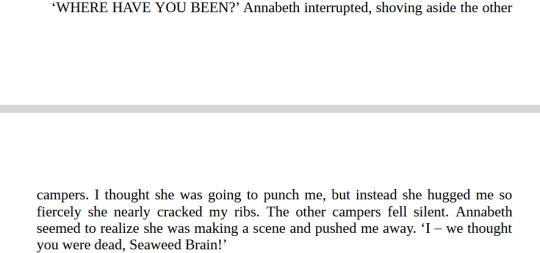
And of course, this comes up briefly in Staff of Hermes as well

The moments are presented as sweet, but the very fact that Percy anticipates being punched or slapped by Annabeth is revealing. It proves that the judo flip is in character for Annabeth but in many ways, Annabeth got worse as she got older. Given she actually flips Percy over and kicks his leg when he talking to Jason in MOA.
That's not even delving into Percy's major emotional insecurities when he is in a relationship with Annabeth, and how in MOA, he is constantly scared to open up to her about the future and uses the analogy of a "glass sculpture" to describe how fragile it feels to him to accidentally break it. Or even how it feels more apparent that Annabeth uses knowledge as a weapon of power to make Percy feel stupid in the relationship to feel superior.

That doesn't come across as someone who is eager to share information because they want to out of genuine passion, that's someone who uses it as a means of power and control.
The sad thing is for Annabeth's character, it makes way too much sense. MOA is a revealing glimpse into her personality but there was already hints of it in her interview in the Bronze Dragon. She does seem to like Percy, but any compliment she might have for him is backhanded at best and insulting at worst.
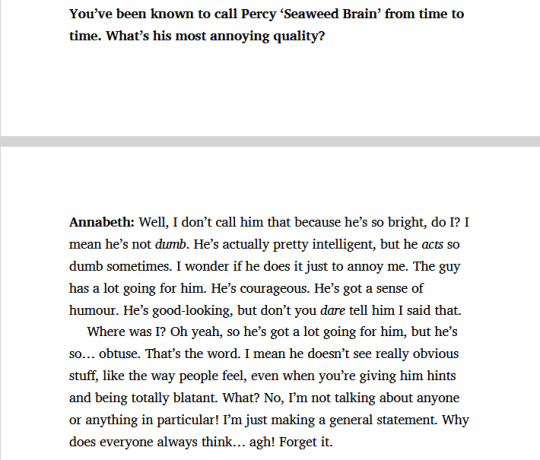
With that, Annabeth comes across as genuinely believing Percy is annoying her deliberately.
It reminded me of a TikTok I saw just recently where a woman was chatting with her husband about seeing Thunderbolts but he shut her down as it being just a movie. When she got upset, he said to her in order to try and ease the situation was "I love when you get excited it's just annoying sometimes." It was gutting to hear not to mention she was visibly upset and she excused her own husband's faults as a part of his healing journey. You can imagine the comment section in that video btw.
It reminded me of another scene, in fact just before the Judo Flip where Annabeth was blaming Percy for "leaving". She thought this.

Excruciating...
Not to gonna lie. That floored me when I reread that scene. I genuinely couldn't believe anyone would even think that about someone they loved. It's a bit like a man saying how much he hates his wife. Conflict does arise in relationships, but this seems like Annabeth is torn between loving and hating Percy and it's not the healthy sort either.
Not to mention she also said this later in the same book.

I know the flip was bad, but this was another layer where it feels like Annabeth genuinely dislikes Percy and oscillates between hate and love for him. Later on she also develops a fear of Percy after Tartarus, which begs the question why they are even together at this point. Annabeth also admitted she hated Percy does fit with her behaviour as she genuinely seems annoyed with Percy in the books but it becomes really questionable as she gets older and even how she acts towards him.
At one point, can we excuse Annabeth actions as a quirk of "trauma" as she is too young to know differently and using that as shield to excuse shitty behaviour as someone who is meant to be a role model.
Riordan doesn't understand the implications that is here. How it's not a healthy dynamic with Percy, who is also an abuse survivor with a fatal flaw of loyalty. His story means a lot to people and to not look into any of his relationships and how that impacted him would be doing that a disservice with the focus that was presented onto it.
Personal loyalty to stick with people no matter how they might treat you, good or bad. It provides a tragic lens onto Percy who might have Gabe as a reference but Gabe's abuse was more direct; he insulted Percy's intelligence with "brain boy", threatened to punch Percy lights out (and probably did that on occasion) and also financially took advantage of him. Annabeth's is a little different. I don't think Annabeth herself is aware of it completely, but it still doesn't erase the emotional belittling and pressure she puts on Percy throughout the series.
It doesn't change the fact that Percy asked her to stop with the nickname in the Bronze Dragon (and probably before as hinted in TTC) refusing to respect that boundary of Percy, who is never really fully at ease around Annabeth and has major emotional insecurities that have emerged so much more poignantly as a result of the relationship.
So why is the Staff of Hermes so special when this is littered throughout their dynamic across the books? Why was this the nail in the coffin for me?
Well, it's rather simple, actually. It's control.
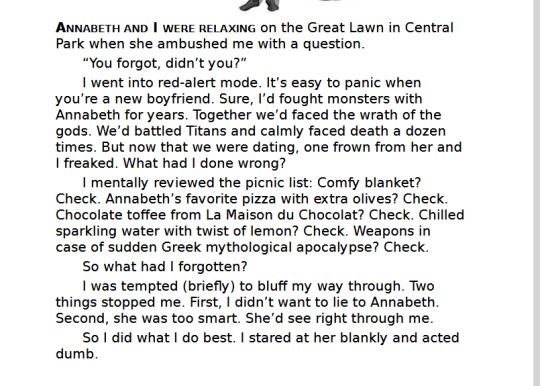
The pair of them are on a date. Percy had clearly arranged matters. The Great Lawn is a lovely place in Central Park and the internary shows Percy took considerable care into the thought process behind it. We know from the first book Percy in not that fussed on olives and he had chocolates and lemondades with them.
Percy is not made of money, we know this firsthand from the first books but even the fact he able to do something like this for date is quite sweet and thoughtful.

Like that is the Great Lawn for reference. Not a bad place for a first date. On a lovely sunny day at that is.
Now it's infered from Frederick's background even before we further learn in Magnus Chase they come from generational wealth in Boston (and Annabeth technically inheriting the Mansion in the end) he is on the richer end. No one can afford housing in San Francisco that easily or be able to work on Sopwith Camels in TTC without a bit of money. That or Annabeth's stepmother is an underrated breadwinner.
Why is this relevant?
It's essentially Annabeth's expectations of what the date is meant to be in her mind versus what Percy could actually do.
Annabeth's character is one of privilege in the books (she is explicitly white coded not only from her appearance, along with her siblings, but also wealth), both from her home life and Camp by Chiron. Chiron informs Annabeth on nearly everything and presumably allowed her to be a Camp Counsellor at a young age. Despite not ready for some of those responsibilities as we see in her introduction, she is very rude to Percy who she should be able to empathise with his situation of losing a loved one (missed chance there to connect them by Rick), acts out against him and is deeply impatient in answering basic questions about Camp, which is her job. This is part of their poorly constructed Meet-Ugly in the books, and by the time Piper arrives, Annabeth is much better at her introductions but it doesn't change the fact that she wasn't fit for the task initially and presumably treated other Campers like that in search of the One. (I doubt she made many friends because of that)
We learn in The Lost Hero, Chiron rarely kept anything from Annabeth (with the exception of the initial theft of the Bolt and the Romans), and from what we see in the series, this is fairly true. Chiron allows her to know about the Great Prophecy from ten, but she also has information about the Labyrinth in BOTL, despite that being a secret. TLO also explores this, and one of the reasons she has the infamous "You're a coward" Percy scene is because Chiron informed her about where Percy was, and crucially neither of them informed Percy of the wartime developments like with Typhon.



I was never fussed on the You're A Coward scene and especially the dissipated resolution in it meant that the tension between the pair was never truly resolved. It never struck me as particularly romantic so to learn that was some people's favourite scene in TLO had me confused because of how frustrating it is. Especially since Percy was asking for confirmation about Rachel's vision and the possible direction. But because it's Rachel, Annabeth refuses to even entertain the possibility, despite the fact SHE said it.
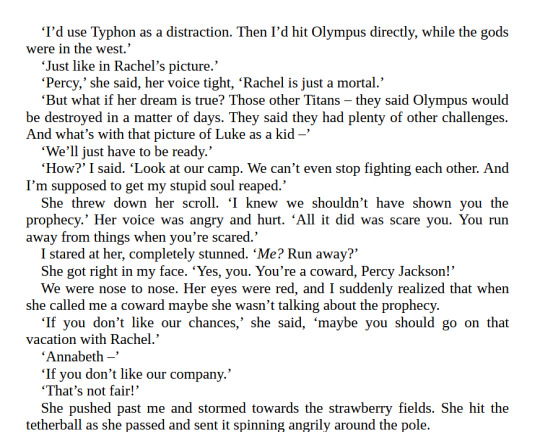
Annabeth has never really liked Rachel but a part of that, I think comes down to mortality itself. Annabeth constantly dismisses Rachel is because she is "just a mortal." But even the way Annabeth talks about mortality is squint-worthy, given that she is meant to be his mortal tie through the Curse of Achilles.
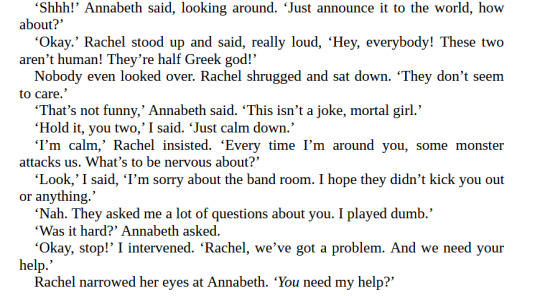


Like the hidden meaning behind these scenes is Rachel and Annabeth are fighting over Percy but honestly, I think that is poorly done given how spiteful it comes across and how Annabeth says mortal like a slur. It's not even the first time we see her dismissive towards mortals either, she doesn't have a high opinion on her stepfamily in the first books and authorities like cops (which honestly fair) but it does spell a different layer to Annabeth's dislike of Rachel is connected with that dislike of mortals.

It's understandable that another reason why Annabeth might act the way she does is linked to her family and also her inherent pride in being a demigod, a divine child of Athena (Athena is the best after all), and a gift onto her father. Either way, it makes her a poor fit as a mortal tie for the Curse of Achilles.
I do think Riordan was using the Curse of Achilles as a crutch to pair Percy and Annabeth together and to rush the romance between them, given that is the primary reason they got together. But it still doesn't change the fact narratively as a mortal tie, Rachel or even Sally would've made more sense.
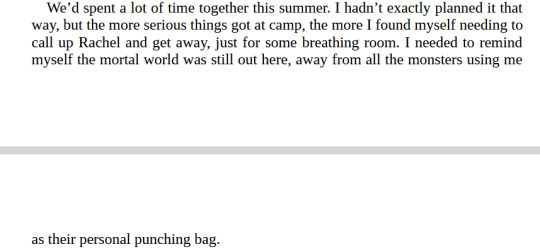
I don't even ship the pair but throughout TLO Percy and Rachel have a crucial impact on each other and the choices they make. As we see to Percy, Rachel is a reminder that there is something there for him in the mortal world and, you can see Rachel seeing Percy as an escape from her own life, given how she joined him on the Labyrinth quest on the spot. Rachel is present in reminding Percy he is not the Hero of the prophecy and was there when Percy gave the pithos to Hestia. Later on Percy does the same for her when her moment came with the Oracle.
This is the precursor to Percy turning down immortality and Rachel plays a critical component in that, but is ultimately the reminder for Percy of the broader picture, much like Annabeth is when Percy looks back and thinks of Camp and all those who died when he declines immortality. the only time I believe Percy's mortal tie to Annabeth made sense beyond a romantic level.

Percy is clearly more comfortable around Rachel.

And Percy made to feel guilty for his interactions around Rachel throughout TLO and much later with Annabeth, this is revealed she does this deliberately to Percy even after they have gotten together in order to assert control.

So at this point, it goes beyond Annabeth's jealousy and possessiveness and into control. Annabeth is a complicated character, but it still doesn't change how one can read into her actions and that in the text and present for all to see. Back to the Coward scene in TLO.
Annabeth is emotional and she does have decent reasons to be. She is scared for Percy. We see this when Percy reacts to the prophecy.
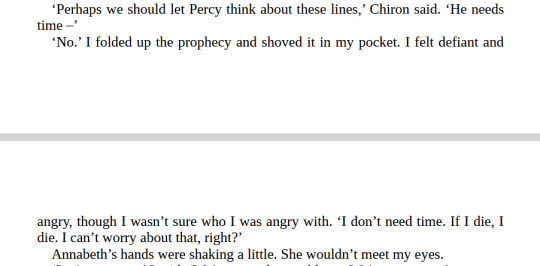
More than anything Annabeth is projecting her own emotional insecurity onto Percy in this scene. About his oncoming death and also his feelings towards her.

She is annoyed with Percy presumably not confessing to her when she clearly has emotions for him and for him spending time with Rachel instead. But she presents it as Percy being the coward and for running away, scared. Rather than actually confess her feelings herself. It should be Percy to be the one to do so. Percy is clearly not a coward running from his death and even in terms of their "romantic relationship" at this point, apart from a kiss which came out of nowhere there is not really a lot of reasons for them to be together (yet) Percy reads between those lines over why she is really annoyed.
This, among many scenes, continues a tension between Percy and Annabeth which is never truly resolved and its' not helped with Annabeth and Rachel making up off-screen, which doesn't make sense given how Annabeth seemed to have genuine emity towards Rachel's perceived crush on Percy.
This connects with who is well established as Annabeth as a prideful character but as controlling as well. Annabeth's pride possibly can't accept what she deems as a mediocre dinner for their first month anniversary.
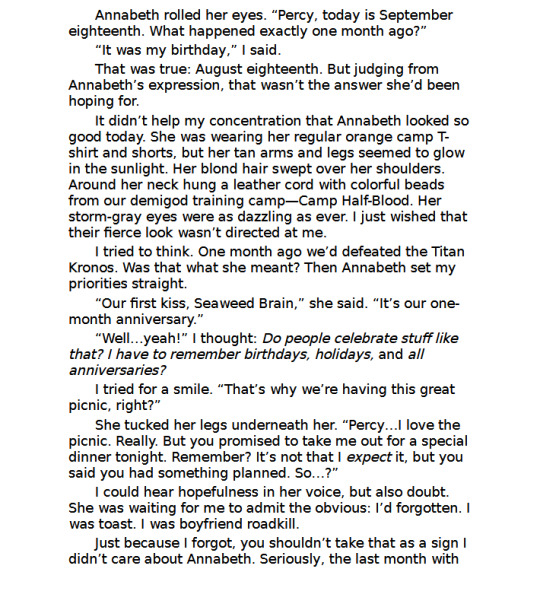
It is genuinely gutting to see Percy, who was doing something nice and presumably this IS the special dinner Annabeth was thinking Percy "promised" her and what she expected him to do instead.
I presume this was the dinner Percy had in mind if he did promise, but for Annabeth she wanted something grander and more important; this wasn't it.
Annabeth wanted to pressure Percy despite him doing something nice; she wanted to keep Percy on his toes, as it were. That's not healthy.
Percy gives a lot in this relationship. He feels obligated to and as we see her, Annabeth expects a lot out of this relationship. A month anniversary is materialistic as hell. Annabeth is also not expected to do anything similar. I would understand Percy's anxiety even further if Annabeth had done something similarly nice, but that isn't the case here.
More often than not, Percy is expected to GIVE and Annabeth often TAKES in the relationship.
As someone who works on celebrating special occasions, this feels petty and ridiculous to expect from a partner. But it's also telling how the picnic dinner was not enough for Annabeth as well since Percy did still do something on their anniversary, even if unintentionally on the anniversary itself. It might not ever be enough for something so "simple".
We know from the series a lot of Percabeth moments are focused on grand and impressive feats. They had their first kiss in a volcano. Annabeth is his mortal tie. They both turned down immortality for each other(they hadn't) and they fell through in Tartarus and walked out together. Etc, Etc.
In many ways they have done a lot together, but it doesn't have the emotional weight it deserves. Percy and Annabeth frankly don't have the chemistry or a real emotional connection as people. Part of that, I think, is due to Riordan clearly trying to push them as a couple before them being friends, and Annabeth's character in particular suffered from this. Stranged from the Red String as it were.
This is meant to be a sweet and domestic moment, and it isn't even a bad idea for a date but it isn't enough. Annabeth had widely different expectations, which can also be a microcosm of how they have completely different views for the future and ideas on how that will turn out. Percy didn't believe a month anniversary was really that important or significant and honestly. He's right. It's not. But Annabeth is not satisfied with a mere picnic for a special dinner and talks about it being more like the year anniversary than a single month.


This is arguably one of their better stories together, too where we see good teamwork and some nice moments between them compared to others. One day I will get into the Bronze Dragon. But for me the focus on the dinner overshadows everything and that is a frequent problem with Percabeth, where there are so much negativity in the relationship I feel gobsmacked whenever I'm expected to clap like a seal whenever they do something positive.
It speaks to me how Percabeth don't really have a lot in common apart from being with each other, fighting threats, or just knowing each other for years.
Percy doesn't appear all that interested in architecture, and Annabeth isn't much into sea life or skateboarding. While Percy had few common threads with Rachel in BOTL which he acknowledged, they both have mutual interests in the environment and peace with each other, which we don't really get with Percabeth. Percabeth feels so performative and stale in comparison that I still struggle to even read them as friends, let alone lovers. Particularly as Annabeth doesn't really respect Percy all that much.
Percabeth desperately needed more time to develop, getting together on the same time a lot of their peers died and the pressure from Camp I don't believe helped later down the line.

Like this comes across as sweet and it is, after all, it's them getting together and then getting chucked in the water. It's a great and grand way to get together for the Finale, YAY!!!!. But it has way too many unresolved issues that we only see blossom even further in HOO with how rushed it was. I find it esoteric. The Curse and by extension, Percy's choice to turn down immortality, feeding into it. Grand reasons to get together but fragile on examination as you wonder what really connects them together and I refuse to see them as this cute and perfect couple, which is the gold standard when they are ironically quite basic.
It makes sense why Percy compares their relationship to a "glass sculpture" and how he really doesn't know Annabeth nor does she in return about Percy. A glass sculpture is something that is so fragile and can break with a good push. It is destined to crash and break. In contrast to Annabeth's grand ideas of making something that will last for thousands of years. (Annabeth also has a connection to glass in her architecture, which I will not get into today but trust me it is there and it is haunting me)
Percy has so much love for Annabeth and treats her with utmost respect in his narration, but that is not really shared to the same degree. It feels so jarring reading their perspectives and how idealised Percy pictures Annabeth in his head, like him remembering her in SON, versus how she acts towards him in MOA
Percabeth is built on grand and lofty moments from the first book which is highlighted with the forced one-sided rivalry all the way to the present to justify them being together. Rather than having something more genuine and real connecting them together.
Annabeth's expecting something more from Percy for their month anniversary is, I feel, emblematic of everything I despise about it.

The fact that Annabeth forgot proves it wasn't about the dinner but control. It was making Percy uncomfortable over "forgetting" despite him doing something nice for her anyway, and that was presumably what he originally had planned for her anyway. It was keeping him on his toes. It's small but very present.

The only reason she isn't mad is that she did get the dinner in the end, and presumably Annabeth knew full well Percy "forgot" but she kept pressuring him anyway. But the fact that she tells Percy to start planning for their second month anniversary...
I don't find that sweet, funny or the one bit pleasant. It feels so materialistic and inconsiderate to Percy, who had a lovely date planned for her with some of her favourite treats and foods. And it didn't look like she cared for that one bit.
That more than anything kills me. The lack of appreciation. And that killed any hopes of their relationship going forward for me.
In fact, she urges Percy to do more. Annabeth doesn't say she will try anything special herself for Percy. No, it's on Percy to pick up the bill here. As I said, Percy is the giver, and Annabeth is the taker in this relationship and that fact is constant.
This story made me read the series completely differently and this is more than a dinner. All Percy can think about is "surviving" a month as Annabeth's boyfriend and hopefully her seeing a future with him, which is quite bleak.
More than anything to me, it just feels tragic reading Percy's attempts to do something nice for his girlfriend being brushed off or discarded like this. Annabeth has a commanding personality, and she promised she would never make things easy for Percy. In that she's right.
This story proves to me, Annabeth will never be satisfied with Percy's attempts and Percy will never feel good enough in this relationship to feel content and genuinely happy in a way that doesn't feel like he's forcing himself to be.
But it did open my eyes and made me consider so much more about why Rick might write a certain way, what he might have been considering when writing Percabeth himself and the likely future they will have in a peacetime without the same worries of a war on the horizon. Cause I can't see it work.
#long post#my posts#drackan's posts#percy jackson#percy jackson and the olympians#pjo#anti percabeth#percabeth critical#anti annabeth chase#though I'm really more#Annabeth chase critical#just covering my bases#there is so much shit one can get into#and how rick writes it#because holy moly#anti rick riordan#rick riordan critical#the staff of hermes#analysis#meta
308 notes
·
View notes
Text
"Don't hatewatch/hateplay because it still gives the company money on its product" and I fully believe and support that but I think RTGame deserves an exception for playing Metaverse simply because whatever money he spent on the game could not possibly match how much money Metaverse and its investors lost when the stocks fell by 25-30% after people saw Dan's stream and how dogshit it was. First person to actually achieve net negative profits from hate-playing.
#rtgame#maige's posts#been going through dan's new clips channel and got reminded just how funny that whole situation was holy shit#he wasnt even intentionally hate-playing it. he just played the game normally and somewhat tried to give it a genuine shot#but it was just that fucking bad#also dont explain to me that it was a coincidence im choosing to believe that dan singlehandedly tanked meta stock bc its funnier that way#and its the world i want to live in
263 notes
·
View notes
Text
"The Lion Has Its Own Historian:" Parallels Between Gorgo and Aglaea
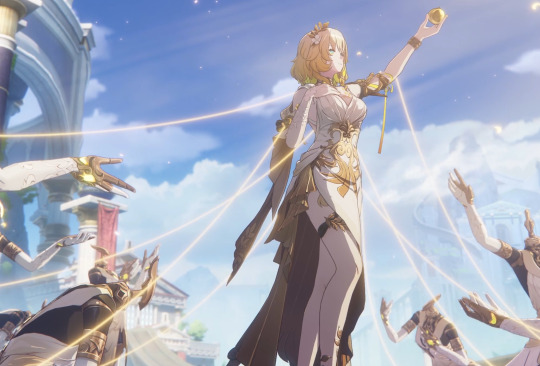
While re-reading Mydei's "As I've Written" stories recently, I was intrigued again by the (seemingly impossible) section in which Aglaea unknowingly echoed Gorgo's words to Mydei, and this led me down a rabbit hole of thought: The roles of Aglaea and Gorgo--not only in Mydei's life but also in the story overall--form some interesting parallels that are worth looking at in closer detail.
Seize the Means of Control
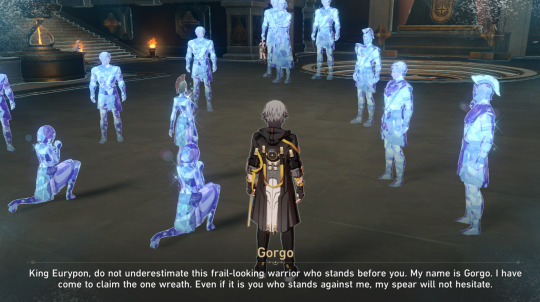
Gorgo's ascension to a position of authority was predicated on power--not only on her martial prowess, which was expected in her culture (i.e. slaying a lion with her bare hands), but through her courage to meet the existing symbol of authority, Eurypon, in single combat and not concede. In Kremnos, status is conferred and maintained through violence. Though on the surface Gorgo defies this belief, she ultimately remains an active participant in Kremnos's tradition of "might makes right" through the Kremnos Festival, reinforcing rather than rejecting her culture's military-centric social structure.
Although Gorgo originally took part in the Kremnos Festival with the intention of beating Eurypon and seizing the throne of Kremnos for herself (presumably because she thought she could rule better), she ultimately chooses to accept his continued leadership and become queen instead, even granting him an heir to cement his legacy. In this way, despite presumably wishing for a less wasteful (of life) philosophy for the Kremnoans, Gorgo becomes one of the foremost beneficiaries of the very mindset she opposes. She clearly wants to reduce the meaningless bloodshed in Kremnos--she strongly rejects the notion of patricide, for example--but she doesn't (at this point) reject the overall structures of the Kremnoan culture, including the belief that combat ability should determine who leads.
In short, her position of authority was achieved strictly through her ability to oppose her foes.

Despite coming from a wholly different culture, one which (ostensibly) values debate, diplomacy, and the rule of law as the primary tools for establishing status, Aglaea's rise to power was remarkably similar to Gorgo's. The game confirms that the prominence and influence of the Chrysos Heirs in Okhema is no lucky accident--instead, Aglaea has clawed her way to the top, fighting tooth and nail to establish herself as a figure of authority in the Holy City.
We're told she exerts her pressure both through economic means, amassing wealth via monopoly on resources such as Amphoreus's internet, and through literal bloodshed.

The story dances around it, but Star Rail's marketing embraces it: Aglaea represents not just the joy of love but also the "deadliness" of romance, the figure of power in Okhema "pulling the strings" and making others dance to the tune of her vision for the future. She basically rules the roost in the Holy City in large part because of her capacity for violence, because of the literal physical and political power she wields as a demigoddess and the leader of the strongest group of fighters on their entire planet.
This "silk concealing steel" behavior reflects not just how she approaches any who oppose her--the Trailblazer and Krateros, for example--but also how even the NPCs throughout Amphoreus view her:
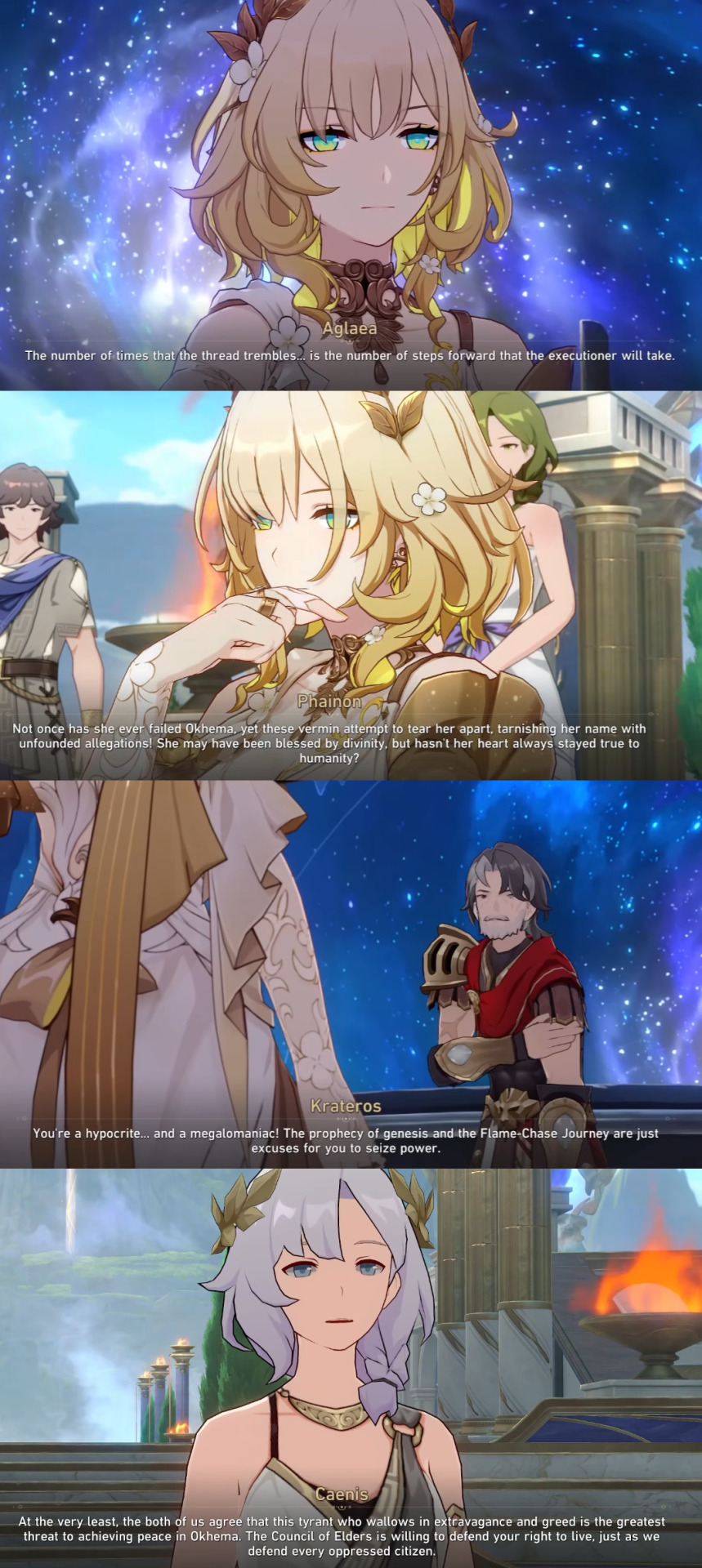
It's particularly Krateros's view of Aglaea which intrigues me, because the very same things he accuses her of are the things Castrum Kremnos is famous for (being warmongers, usurpers of power, etc.). By all rights, he should admire a "queen" such as Aglaea who rules by force and who is leading her people into the greatest war Amphoreus as ever known. And yet he and the rest of the Kremnoans seem to revile Aglaea for the very same things they saw as virtues in Gorgo.
The context is the key: Gorgo seizing power for herself is viewed as honorable and good because it happened in the context of Kremnos, while Aglaea's power struggle and military dominance occur within the so-claimed peaceful structure of Okhema's democratic society, casting her in the role of a "power-hungry tyrant" for the people living in Okhema, even those who should most appreciate her mindset.
Comparing Gorgo and Aglaea in this way highlights a key double standard in the way the Amphoreans react to women who rise to power, and makes it clear how thin the veneer of Okhema's "peace" really is. Stepping to the top rung of the social ladder through the threat of martial retaliation, Aglaea's battle against the Council and the Flame Chase's foes is no different from Gorgo tearing a lion apart with her bare hands, challenging a king, and taking her place at the top of Kremnos's hierarchy by seizing her weapon and making her stand. All that differs is how violence is received in their contrasting cultures, resulting in two diametrically opposed reactions from the "mere mortals" around them.
With Violence as Your Tool
I think it's important to emphasize that Aglaea and Gorgo also parallel each other not just in their rise to authority through physical power itself, but also in their stances on the necessity of that power: Both Aglaea and Gorgo (at least at first) view bloodshed as a necessary evil, an unpleasant facet of life that one must accept in order to achieve a goal. Violence, for both Gorgo and Aglaea, is a tool.
We see this clearly with Gorgo throughout her flashbacks, both in her initial fight with Eurypon (where she claims she would embrace the notion of death only so long as it is not "unnecessary") and in her other confrontations with Eurypon: Gorgo insists that the tradition of regicide must be broken and makes Eurypon promise not to lead Mydei to that path--yet later, she goes so far as to scold Eurypon when he shies away from his fate, essentially calling him a coward for fearing the prophecy that Mydei would one day kill him. "What prince of Kremnos hasn't killed his father?" she taunts, implying that, even as Gorgo fought to change the violent history of Kremnos, she still believed--at least at that moment--that refusing to face violence when it was foreordained made Eurypon a weak and unfit ruler.

However, we ultimately see this stance change. In Mydei's dream of training with his mother, Gorgo reveals that nearly losing Mydei completely changed her perspective on Kremnos's beliefs, finally killing any faith she had in their system of rule and their constant pursuit of Strife for strife's sake. She rejects the notion of combat being the ultimate test of a person's worth, explicitly casts aside her title and role as queen of Kremnos, and embraces a kinder identity as strictly "Mydei's mother." This is a crisis of faith brought on by experiencing the impacts of Kremnos's faith firsthand--by being forced to experience grievous loss, Gorgo is implied to have grown as a person, from one who is willing to accept violence as a tool to get ahead, into one who solely values peace.
These views, too, mirror Aglaea's pursuit of the Flame Chase Journey and her "hidden" feelings toward its necessary loss. We know already that Aglaea views the threat of violence as her go-to "means to an end" when it comes to achieving the Chrysos Heirs' goals.

She is not at all above putting people into harm's way to pursue the prophecy, such as letting Phainon take the Strife trial even knowing that he would fail, and she tells us players over and over again that her own humanity has nearly vanished, claiming that she now no longer has sufficient empathy for humankind to be swayed away from the path of Era Nova.

This is clearly not true (given how deeply she cares for Tribbie, how kind she is to Castorice, and how unwilling she is to actually bring any harm to Anaxa), but Aglaea insists on this emotionless illusion likely because it makes it easier to tolerate the cruelty required to continue pursuing her goal--she needs it to be true that the last of her humanity has already waned, because this is what makes it easier to accept that the Flame Chase Journey is a journey of "loss," one that is fueled by bloodshed.
It is an unfortunate truth of the prophecy that people will die in pursuit of the dream, that capturing all the coreflames and pushing the world forcibly into its next cycle will cost lives and require cold, rational decisions that will crush people's happiness and freedom. Aglaea cannot hesitate, cannot waver, cannot choose kindness over action.
But, like Gorgo, we know that accepting violence as a tool does not mean that the person wielding the tool is always happy to do so. As Gorgo loses her genuine faith in Kremnos's beliefs and begins to view training Mydei for war as nothing more than a rote requirement, devoid of meaning, Aglaea too struggles to uphold her emotionless facade, a protective cocoon whose cracks reveal the enormous weight she is bearing and how deeply the inhumanity of her own decisions wounds her.
We see this clearly in her character stories, where the actions and then later loss of her maid completely reshape her definition of "beauty":
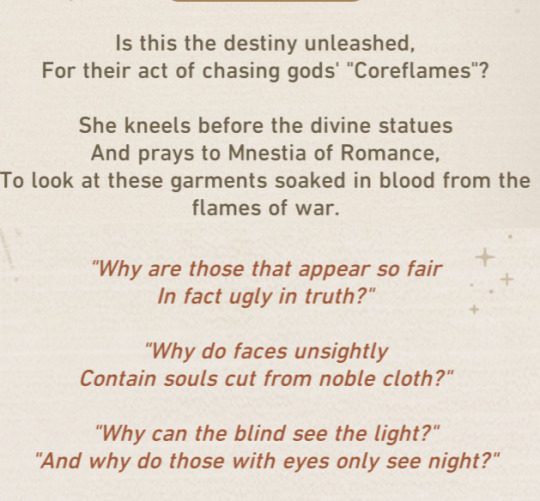
And we also see it very clearly in her behavior toward Anaxa, where she hesitates at the crucial moment, unable to commit to the course of action that she herself set in motion:

Like Gorgo who longs for a softer world where she can simply be Mydei's mother, Aglaea too (no matter how much she claims) has not lost the part of herself that cares not only for the people closest to her but even for the innocents of the world, the boy who wants to bring his sister something beautiful, the girl who shares her bracelet...

Her nature, no matter how much of it has worn away, is at its core humble and kind--reviling the pain of others.
It's this fundamental conflict between love and what must be done that lends both Gorgo and Aglaea their depth as characters, that grants them both an air of nobility, in the way that everyone good who suffers is noble. Being forced to cause harm without a desire to do so creates quintessentially contradictory characters, making the audience privy to both their external mettle and their internal hesitation, easily humanizing both of them. Aglaea and Gorgo are virtuous women whose cruelty is justified for the greater good. Yet in watching both of them struggle under the immense pressure of that cruelty, we recognize the inherent evil of a world that forces kind-hearted people into positions where bloodshed is their only path forward.
Both Aglaea and Gorgo are not women who normally hesitate to seize the tools available to them, or the kind of women who will shy away from wielding their strongest weapon--the threat of death--with impunity. The reaction to female characters who are willing to exert this kind of power over others (including over the men in their lives) both in-game and in the fandom (where Aglaea in particular is treated poorly for her "coldness") demonstrates how unique this particular type of female character still is, and suggests interesting overall power dynamics in Amphoreus that privilege women willing to utilize violence even above men who choose the same route, despite the strong patriarchal bent one might expect of a story with ancient Greece as its primary influence.
Mydei is not the son of Eurypon, but explicitly and always "the son of Gorgo" even in flashbacks where Eurypon is still alive; in Okhema, both the Chrysos Heirs and the Council appear to be primarily directed by women (Caenis occupies the more visible role of Aglaea's opponent than Lygus does), with all of Okhema's demigods (including Cipher) being female. Gorgo's violence is regarded as honorable; Aglaea is met with disapproval from her peace-loving society but no one ever actually dares to stop her. Perhaps Krateros comes closest, by defying Aglaea's will and entering the Strife trial without her permission, but even he ultimately has to be rescued from Aglaea's clutches by Mydei, who explicitly invokes his mother's name to ensure Krateros's safety. Say it with me: The male character with the highest social status in all of Amphoreus has to rely on the power and reputation of his mother to rescue another man from a powerful woman. Amphoreus really said "Ladies first." 💯

Anaxa's reactions to Aglaea are humorous but are also a perfect example of this overall social structure in Amphoreus which assumes strong women in power have an automatic degree of legitimacy because they are willing to seize violence as their means, despite violence being, in real-world cultures at least, stereotypically the domain of men. In 3.1, Anaxa simply accepts it as a given that he will become Aglaea's prisoner and that she will be able to do whatever she wants to him, because nothing in Okhema's social, political, or military structures would enable him to genuinely oppose her (if he even wanted to).

Even in his (sort of) fake-out "siding with the Council" phase, all Anaxa does is move himself from the grasp of one powerful woman to the next, shifting from being Aglaea's prisoner to Caenis's ace. Cerces even has an entire voiceline where she points out word-for-word that Anaxa is functionally just moving from one woman's cage to the next. Caenis in particular seems to view Anaxa as an object, a biting dog she can keep on a leash until she sics him on her enemy. Anaxa obviously is not so easily manipulated, but Caenis's threat about karma eventually comes true, and he nevertheless suffers the final wrath of the Holy City's society, being judged more harshly than anyone else for his seeming unwillingness to submit to the power of either woman in control of Okhema.
Both literally and thematically, the game tells us players that Aglaea and Gorgo are courageous and effective leaders because they live by the blade, because they are willing to harden their hearts and do whatever it takes, whether that means taking another's life--or their own.
To Usher in a New Era
Of course what really distinguishes both Gorgo and Aglaea's willingness to cause harm from malevolent forces in Amphoreus is their ultimate intent. Although both women are willing to do whatever it takes, they do so only in service to a greater purpose, one that they believe will better their world. In this way, Amphoreus's writers reinforce the underlying impression in Amphoreus's plot that women are more trustworthy and reliable leaders than their corresponding male counterparts. Slight side note on this, but it's kind of funny just how consistent this is--even "outside" of Amphoreus, Welt and Sunday had to turn to Herta to save the day, while inside Amphoreus, Trailblazer is still relying on Acheron's advice to get them through. (When you cater to the incels so hard you somehow loop back around into writing staunchly feminist plotlines...)
The message, repeated and unsubtle, is that there is a link between women's leadership and righteousness, with both Gorgo and Aglaea representing an idealistic desire for a better future for Kremnos and Amphoreus as a whole--one by opposing fate and the other by enforcing it.
Both Gorgo and Aglaea face prophecies that promise to reshape the world as they know it, prophecies which require them to make decisions that will ultimately cost them their lives in a desperate bid to influence history toward the best path. Gorgo rejects the prophecy she is given, determined to protect Mydei despite the destruction the omens claim he will bring to Castrum Kremnos.
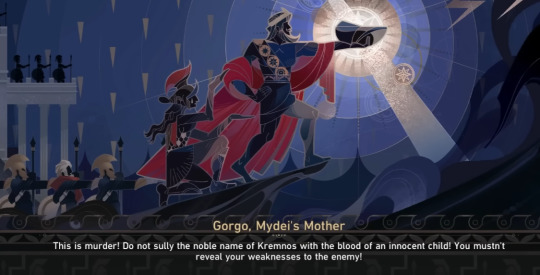
Because of the players' predilections for Mydei, this choice to reject fate paints Gorgo as a heroine, an unselfish and moral person who will choose the life of an innocent child over she own safety. Her willingness to fight to the death to prevent Eurypon's atrocity against their son flies in the face of fate itself, attempting to stop an inevitable, self-fulfilling prophecy.
And, in fact, the game even teases us with the idea: What would Kremnos have been like if Gorgo succeeded? When Mydei returns to Kremnos, he either "envisions" or actually experiences (via timelines bleeding into each other), a seemingly parallel universe where Gorgo succeeded in saving him from the Sea of Souls, and where she clearly rallied the people of Kremnos to her cause. The Kremnos we see in that vision is entirely different from Eurypon's:

The people are happy, rejoicing and at ease, talking about pomegranates and writing and playing games with kids, while the sun paints the whole city in a soft and gleaming gold.
Contrast that with the Kremnos that Trailblazer and Castorice find when they travel back into the past where Eurypon betrayed his wife and left Mydei in the sea:
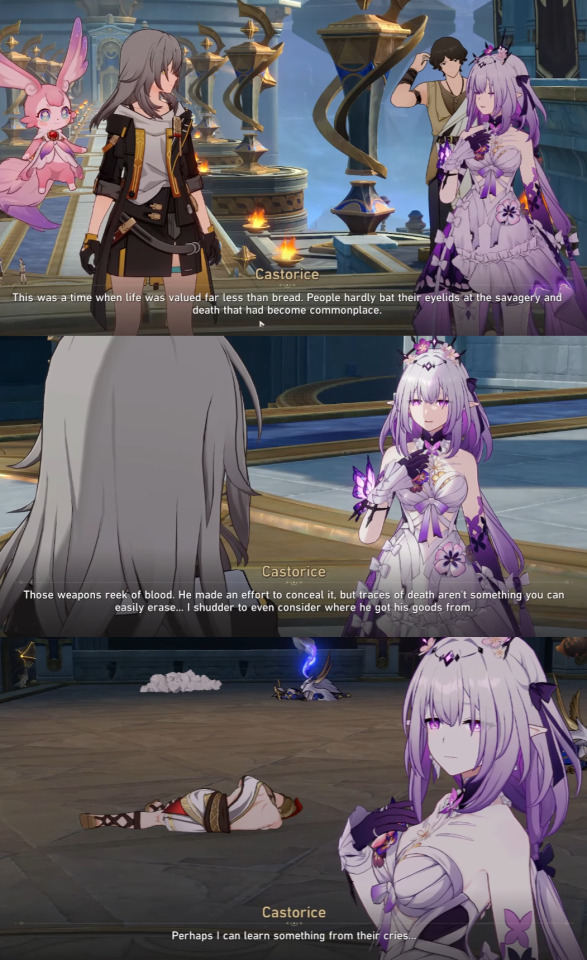
In the seemingly alternate timeline where Gorgo lives long enough to raise Mydei, the Kremnos we're presented with... looks a lot like Okhema. Looks a lot like the peaceful, idyllic Holy City where children frolic in the streets and the people are still full of light and life. By defying fate, we are shown (at least in some fragment of Amphoreus's timeline) that Gorgo achieves what she had longed for in Kremnos from the start, creating a better, gentler future for the people, prosperous and free of the cycle of Strife and meaningless violence that had plagued their kingdom for thousands of years. In this way, we can say that, for that lost timeline at least, Gorgo essentially achieved the Era Nova for Kremnos, ushering in a time of peace for her people. What Aglaea seeks, the game shows us that Gorgo was capable of achieving.
Conversely, Aglaea's path forward involves taking the complete opposite road: Rather than rejecting fate to create a better future, Aglaea seeks to embrace it. She has fully invested herself and her resources in the prophecy of the Flame Chase. She has to, because if there's no Era Nova to look forward to, then there's no hope at all for Amphoreus, and how can it be that something so beautiful is doomed to total destruction? If the Flame Chase Journey will end in a new start, if someone--anyone--will get to live to see the world born anew, then every sacrifice, every burden, every agony will have been worth it.
By embracing her prophesied fate instead of rejecting it, Aglaea is taking the same decisive stand as Gorgo, seizing the future of her world in her own hands and forcing Amphoreus along the path toward what she believes will definitely be a brighter future.
Not only does the description of Era Nova match the idyllic Castrum Kremnos we see under Gorgo's likely rule, but even the moments where both women truly make their stand and reckon with fate reflect each other as well: Gorgo demands her fellow Kremnoans stand with her, hoping they will see the wickedness of Eurypon's decision and reject blind faith in the prophecy they've been given. With her own strength, if even just Krateros alone had stood with her, she easily would have been able to push back against Eurypon's scheme. She lays out her vision for a different future, rejects the notions of the past, and is met with silence.
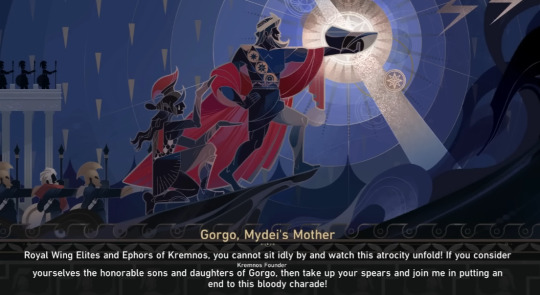
Meanwhile, Aglaea faces the Council of Elders in Okhema, where the decision about the Flame Chase Journey hangs in the balance, waiting on the final vote of a single person to join up with her cause. Just like Gorgo, the alignment of even one person to Aglaea's cause will make proof of her righteousness, prove the she's right. Aglaea lays down the gauntlet, demands the loyalty of her allies--and her leadership and vision are rewarded when Anaxa joins up with the cause, tipping the literal balance of the scales towards the new era Aglaea believes her efforts will bring to fruition.
(In essence, at the end of 3.2, we get to watch Anaxa do exactly what Krateros failed to--stand on the side of the woman who wields justice.)
Ultimately, through they do it through diametrically opposite paths--rejecting and embracing prophecy, respectively--both women are characterized by their drive to create change, their refusal to accept a quiet descent into cruelty and darkness. Both take a stand, outlining their vision for the right way to go on, for a better, softer, brighter world, seeking the loyalty of comrades to legitimize their causes, and--failing that--willing to make the ultimate sacrifice of themselves to further their truly noble causes.
The strength of both women lies not just in their martial prowess, but in their unwavering dedication to a just cause, no matter the cost to themselves.

Generational Influence
What actually started me off on this whole look at Gorgo and Aglaea as thematic parallels was Mydei's scenes with Aglaea, particularly how he clearly considers her a role model for ideal leadership. While I won't go so far as to say Aglaea perceives herself filling any sort of maternal role for Mydei, I think the connection is obvious on Mydei's end: Having never gotten the chance to truly meet his mother, Mydei is almost certainly projecting "the leader my mother would have been" onto Aglaea. (Or perhaps we should say the opposite: The empty spaces in Mydei's mind when he thinks of "Gorgo" are sutured closed with Aglaea's golden filigree.)
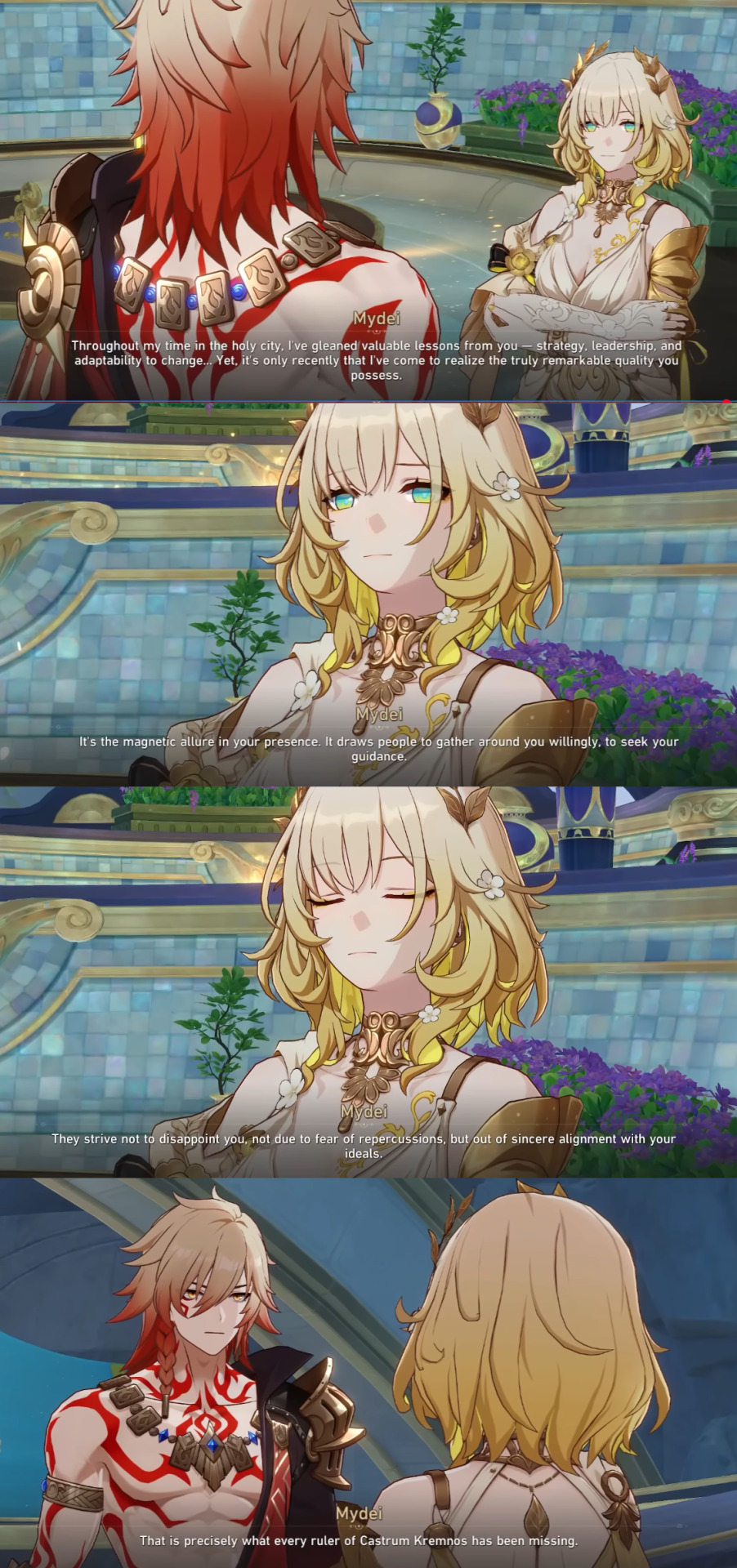
Does this sort of praise sound a bit familiar? It ought to, because this is how Krateros describes Gorgo:

Both women are characterized by their ability to move people's hearts, to inspire hope, and to model ideal strategy for others.
So how could Mydei do anything but link Aglaea's leadership with the life he imagines his mother would have led if she had had the chance to rule Kremnos?
Consider the entire situation from Mydei's perspective: His people have just been (forcibly) rescued from an insane king whose true downfall began with his betrayal of wife, their nation's one genuinely noble leader. If Gorgo had been their ruler, none of this suffering would ever have happened. Fleeing the madness and death Nikador is bringing to Kremnos, the entire surviving host of his people migrate to the "Holy City," the (supposed) last bastion of light and peace and happiness in Amphoreus--which is effectively ruled by a woman so powerful that she knows and sees all.
Seemingly effortlessly, she commands respect and fealty, marshaling her forces to do battle with the might of her own sword, while fighting to maintain the very same values Mydei's mother wanted to bring to her own nation. While being unafraid of bloodshed, she treasures life more than anything else. She's honest, direct, and unflinching, but still, despite everything, kind and dedicated to protecting the world she loves.
Mydei doesn't know his mother but there she is. There's the "queen" that his mother should have had the chance to be. There is the leader that Kremnos needed. There is the powerful woman whose dream for the future could have single-handedly changed the course of fate.
Clearly, for lack of personal experience, the Gorgo in Mydei's mind is less a real person and much more an idealized figure. His only direct knowledge of her comes from one "dream," where she tells him that he's more important than the world to her (undoubtedly leaving Mydei to grapple with the question of whether that is something she truly felt or something he just wishes to be true, by the way). Mydei's only other frame of reference for his mother is Krateros's blind veneration, with Krateros constantly holding Gorgo up as the standard Mydei should meet.

Gorgo is clearly on an achingly high pedestal for Mydei. He shaped his entire youth around the need to avenge her, and then he shaped his entire adult ideology around her vision for Kremnos. In "our" timeline, Gorgo may not have lived to create the change she hoped for, but her goal was ultimately achieved nonetheless, through the inter-generational influence her memory had over Mydei. It was Gorgo's hatred of wasteful bloodshed that helped Mydei to hate it too. It was Gorgo's desire to change Kremnos's traditions that led Mydei to consider tearing down its dynasty. It's his mother's gentle love for her people that echoes in Mydei's same affection.
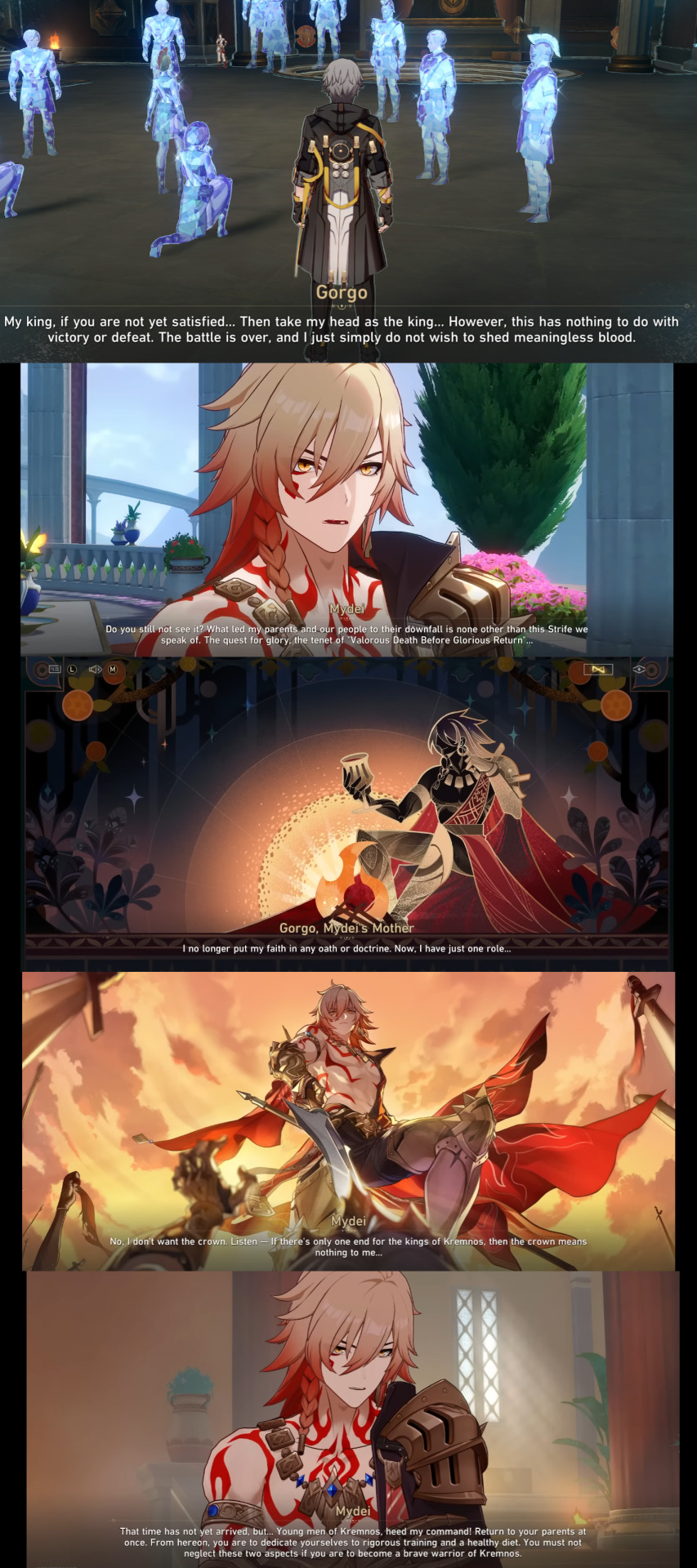
And through Aglaea, all those views and lessons were enforced. Before joining up with the Flame Chase Journey, the game tells us that Mydei's life was effectively still a hellscape even when he had his friends: They wandered the land with nowhere to call home and were attacked by (or themselves attacked) everyone they met, engaging in endless violence just to keep existing, while he watched his companions be brutally murdered one by one. At the risk of extreme understatement: Mydei was not living the life his mother wanted for him.
After joining the Flame Chase Journey, Mydei becomes one of the "heroes" who dedicates himself to protecting innocents and serving as a guardian; he finds a cause, does his best to create a new home for his people, and works to reshape their views towards the beliefs his mother espoused. Like Gorgo putting down her weapon and taking up the role of "just your mother," Mydei gets to (temporarily, briefly) let down his guard and live as just a person, cooking sweets, roleplaying with kids, and cuddling with chimeras.
He inches closer to the dream of finding meaning in finding peace.
And if it was Gorgo who inspired those choices, then it was Aglaea who made them possible--Aglaea who accepted the Kremnoan Detachment into Okhema, Aglaea who literally put aside her fear of Mydei to accept him as a fellow Chrysos Heir, Aglaea who guided him, Aglaea who modeled transformational leadership for him, Aglaea who gave him the final (if forceful) push he needed to commit to changing his people's future, destroying the bloodstained Kremnos of the past. In all his struggles to move forward, the threads of Aglaea and Gorgo's mirrored ideology lead Mydei through the labyrinth of uncertainty.
All things considered, Gorgo might actually be the character with the single most significant impact on Amphoreus's current plot other than the Trailblazer, because the guidance and beliefs she instilled in Mydei will live much longer than Gorgo and even Aglaea herself--may even live on through the end of the world and the rebirth of all of Amphoreus, because it is her exact ideology that becomes the backbone of Mydei's life advice to Castorice. When Castorice reveals their future, telling him the demigods of today's Amphoreus will become the titans of the new cycle, Mydei looks her in the eye and tells her the exact thing he learned from his mother and Aglaea:

Don't accept defeat--defy despair with everything you have and weave the future with your own two hands.
Perhaps nowhere do we see the parallels between Gorgo and Aglaea more clearly than in the "As I've Written" chapter, where we are told that what ultimately swayed Mydei's decision to join the Flame Chase Journey was when, completely without knowing it, Aglaea spoke the exact same words as his mother.
Though the organization of "As I've Written" is often unclear, making it difficult to determine which passages are actually linked to each other and which are entirely separate, I'm going to personally interpret the quote included in Mydei's third chapter as that special sentence once spoken by both Gorgo and Aglaea:
"The lion has its own historian, and the history of the hunt should not be held by the hunter alone."
Putting aside that all of this is completely impossible in the timeline as we know it (Mydei has no way of remembering the sentences his mother might have spoken to him, and none of the sentences in any flashbacks or her letter to him have anything to do with lions or historians), if this is the line echoed by both women, it is an obviously poignant phrase that would immediately signify to Mydei that Aglaea's ideology matches his mother's.
Although the English translation of "As I've Written" leaves A LOT to be desired (sometimes to the point of being entirely incomprehensible; I legitimately have no idea who okayed those translations, rife as they are with just straight up grammar errors lol), the origin of this phrase is unmistakable. It comes from the African proverb that is normally translated as:
"Until the lion has its own historian, the history of the hunt will always glorify the hunter."
Essentially, "History is written by the victors."
If we take the English translation seriously, what Aglaea and Gorgo would have been saying is that "the defeated" (which, by the way, is symbolized by the lion repeatedly in Kremnos's history) should have their own historian, and that no one should get to speak for them. That is, of course, that no one should get to speak for Mydei except himself--that he should take charge of his own destiny and write his own history into the books.
Krateros repeatedly insists that Mydei is the hunter, the one who should be controlling the whole hunting ground:
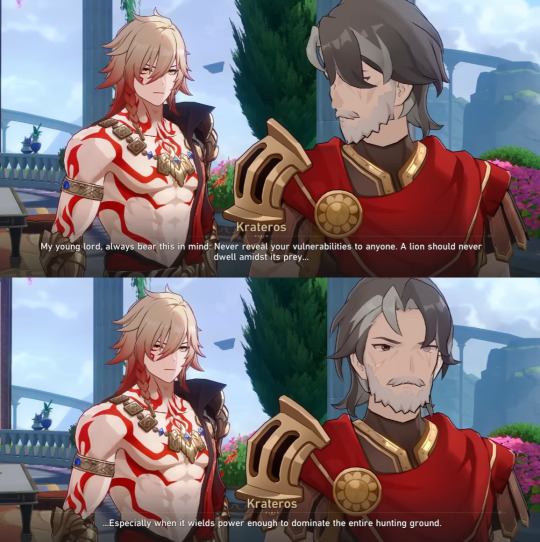
But Aglaea sees through Mydei in the first moment of meeting him--sees that he's not the victor but the victim, not the Kremnoan king-to-be but the "wandering lion" who is at risk of being slaughtered on the altar of Kremnos's glory. Kremnos's history is not the "hunting lion"--it's the lion hunt. Gorgo the founder killed the lion, Gorgo the mother killed the lion... So where does that leave Mydei, the symbolic lion?
This line is saying, Aglaea and Gorgo would both have been saying: I see you. I see that there's an entire unspoken legacy weighing on your shoulders, a horror you're fleeing from like wounded prey, a fierce desire in you to refuse the tale this world is writing for you. And in supposedly echoing Gorgo's words, Aglaea would also have echoed the very core of Gorgo's faith:
Those who have lost everything still deserve the chance to shape their own futures.
Those who have faced impossible odds, those who Fate itself has marked for death, those who would martyr themselves to secure the futures of others can and should still rage against the dying of the light, still fight with every tooth and nail to bring about a different ending.
When no one but (apparently) the ghost of Gorgo in his head had ever said it to him, Aglaea told Mydei:
If you want a different history, you can write it.
Of course he joined the Flame Chase Journey after seeing that its leader carries the very same deep-rooted goodness as his mother.
And while we're here talking about the mirrored ideologies and guidance both women have offered to Mydei, I also want to add a tiny aside about Aglaea's symbolic leadership of the other Kremnoans as well.
Although of course Mydei remains their de facto leader even in Okhema, Mydei himself makes a big deal out of the Kremnoans having submitted to Aglaea's authority, repeating in several places that the Kremnoans have a duty to follow her commands.

This isn't an off-hand statement; for someone who should have already been crowned king to state in his own words that his people should submit to someone else's authority is effectively tantamount to ceding his throne specifically to her--Mydei has essentially handed over the reins of Kremnoan leadership to Aglaea. He's the crown prince, but she's effectively the queen (that his mother never got to be). The promotional materials even label Aglaea and Mydei as occupying the same role ("King"). This is especially clear in how the Kremnoans refer to her. In multiple places, Aglaea is referred to as "the golden-haired usurper."
You don't get called a "usurper" unless people believe you're attempting to undermine their current ruler. In all but flat out saying it, the other Kremnoans perceive Aglaea as usurping Mydei's authority, despite Mydei himself willingly giving that power to her. Mydei isn't careless with the Kremnoans' futures, he doesn't shirk his duties as their crown prince, and he certainly would never surrender his power to a weak, unfit ruler. Undoubtedly, Mydei is comfortable with the idea of ceding authority to Aglaea in part because he recognizes his mother in her, sees the qualities that elevated Gorgo to royalty in Kremnos alive and well in Aglaea's Okhema. In this way, perhaps we could say that another factor contributing to Mydei's hesitance to take up Kremnos's throne might be a subconscious sense that the Kremnoans are already in the right hands, that Aglaea--embodying the ideal leadership Mydei projects onto the memory of his mother--is a better fit than he could ever be to lead them anyway?
Heck, while we're at it, I think it's even interesting that the cities of Okhema and Kremnos mirror each other so much, down to things that honestly don't make sense: We're told the legend explaining the lion heads on the walls in Kremnos, but... why are there are also talking lion heads all over Okhema's walls? Gorgo who tore the head off the Tretos lion is echoed in Aglaea, who rules a kinder, softer city still symbolized by the lion, where the talking lion heads get to be gossips and riddle masters instead of war strategists.

Okay, and the last silly thing I want to say: Aglaea would definitely not call herself a mother figure for Mydei, but after 3.2 reveals Gorgo's tough love methods, Aglaea's attempts at scolding him start to look pretty familiar, from her exasperated chiding to her genuine criticism:
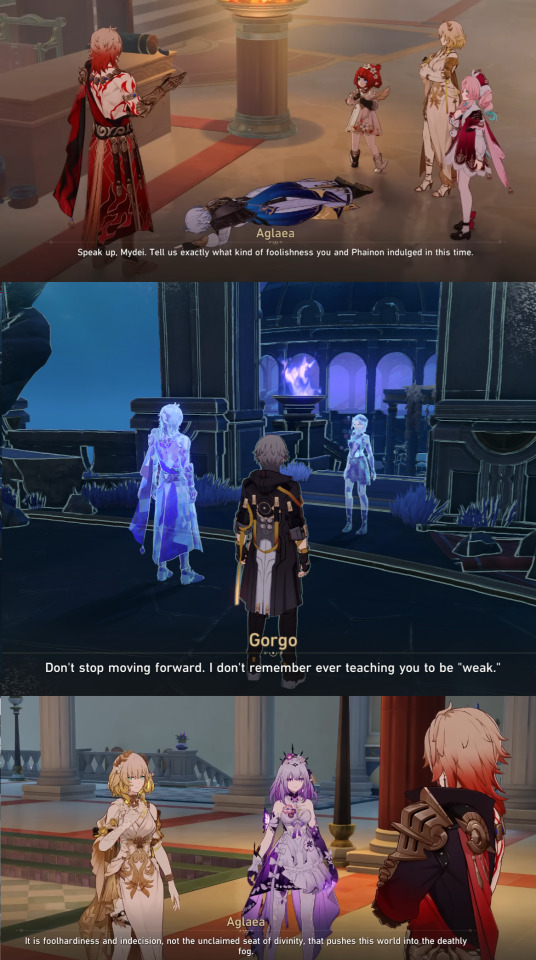
Mydei has it tough, having to meet the expectations of women like these lol.
To Fade from the World
Sorry, that was a bit too light-hearted for me, so time to end this post with some more pain:
A final point I think worth comparing between Gorgo and Aglaea is the ultimate fate that both of them face in the story: Gorgo is already gone, but Aglaea is not far behind.
Gorgo's death in particular is treated as abominable. Kremnoans may be warmongers and Strife worshipers, but they're supposed to be honorable about it. Key to their obsession with combat is the idea of noble combat, between contestants who are each given a fair chance. Despite being Gorgo's greatest ally, Krateros does not stand up and join her in her revolt against Eurypon, likely because of that same "might makes right" mindset that shaped so much of Kremnos's decision-making: If Gorgo's cause was truly righteous, then she should have been able to stand up for it herself and win a duel against Eurypon. If it had been a fair contest as expected by Kremnoan cultural standards, then whoever won would have been considered the "correct" person, and no one could have contested the fair results.
But Eurypon's cowardice drove him completely from the path of Kremnos's sacred virtues, causing him to betray their values by betraying his wife, using poison to deny her her fair chance in the duel. This action--forsaking the core tenets of Nikador's divinity--marks the truest extent of Eurypon's downfall, and cements that he is utterly unfit to rule, lacking both the courage to confront his wife in fair combat and the honor to reject under-handed schemes to ensure victory.
Gorgo's death is treated as a tragedy, an act that entirely shapes the course of the story through Mydei's loss to the sea and his subsequent quest for vengeance. It was cowardly betrayal that took away Kremnos's path to a brighter future, locking the self-fulfilling prophecy of Kremnos's downfall into place.
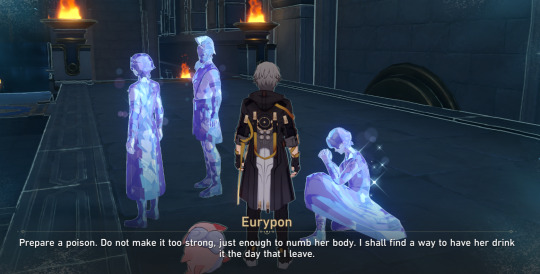
And this, of course, is a perfect mirror to the prophesied end Aglaea is going to face, possibly sooner rather than later. Upon their ascension as demigods, each Chrysos Heir is told how their life will end. Aglaea's prophecy states: "You shall have your final bath in warm and radiant gold."

As Aglaea is most often seen there, the assumption is that she will literally die in the baths--Mydei states this in-game, saying "If a normal person heard that prophecy, they'd probably just stop coming to the baths." Aglaea effectively dismisses this threat (in a very Kremnoan fashion even, lol) by simply saying "Well, who cares? I like baths!" Whatever will be, will be; if her assassin has the strength to end a demigoddess, then truly, it doesn't matter where she goes in Okhema or across the world--fate will find her.
Of course, there's also the possible interpretation that "final bath in gold" refers simply to bathing in her own golden Chrysos Heir blood...
But in either case, the prophecy, Mydei's comments, and some plot leaks I've seen all point towards a violent and unexpected end--likely at the hands of a betrayal.
Like Gorgo, Aglaea will not live to see the world she wished to create, the softer, golden future she wanted to bring to her people. At the hands of her enemies, either facing it with honor or in an unexpected moment of vulnerability, Aglaea will be eliminated before the final hour, fading from Amphoreus's memory as the survivors succeed--or fail--to usher in the new era she sacrificed everything to create.
Although both unique characters on their own, entirely separate from each other, examining Aglaea and Gorgo's parallel plot points, core character traits, and their roles and influences on others throughout the course of the story reveals yet another incredible "echo effect" in Amphoreus's writing, aligning opposites--Okhema and Kremnos, Beauty and Strife--through eerily similar patterns and revealing the enduring thematic threads that bind together the separate portions of Amphoreus's tale.
More than anything, Amphoreus feels to me like a very Hamilton-esque "Who lives, who dies, who tells your story?" plot, one that hinges on the question of who has the power to shape and reshape the future of their world, who has the power to break through a pre-ordained structure and bring about a better end--who has the courage to sacrifice it all to seize the reins of fate itself.
Through Aglaea and Gorgo, the story reinforces a message about women in power, women who perfectly balance violence (the traditional domain of male figures) with love, with beauty, and with righteousness to shake the foundations of their world. In what they value and how they lead, the story mirrors and mirrors again, mise en abyme, the message that those who are willing to give it all for the greater good are the true crafters of our story.
(Perhaps all this is preparing for the presence of another woman, one just as willing or more to do all that must be done to usher in a brighter future for her world?)
The history of the hunt should not be held by the hunter alone.
The lion has its own historian--and so too does the lioness.
Although Gorgo and Aglaea will both fall before that golden Era Nova can be achieved, the marks they have left on Amphoreus's plot, through their legacies of defiance and grace picked up and carried, torch-like, by other characters, demonstrate just how central both women were to all that happened in the world's past and all that will happen in its future.

#honkai star rail#aglaea#gorgo#mydei's mother#amphoreus#character analysis#hsr meta#this is the post I had mentioned starting a while ago#and ended up with a bit of a sour taste in my mouth over the hsr fandom#but then thinking about Aglaea and Gorgo revived my love#so fuck it we ball#two absolute queens#and the story makes a fantastic mirror image#of vastly different characters whose hearts are well aligned#Mydei's relationship with Aglaea is very precious to me#SHE WAS AFRAID OF HIM#and he's just like “I wish my mom was still alive so she could rule our country like you rule yours” T_T#like ma'am#that's your secret self-appointed mentee you had no idea was idolizing you and taking notes on your leadership#I wish we had gotten to see any of this in the game#Mydei's efforts to be more Aglaea-like for his own people lol#I'm also still laughing to myself#over the fact that Krateros clearly worshiped the ground Gorgo walked on#and then is like “AGLAEA IS THE WORST”#Sir???#that's the Okheman version of your grown ass man crush???#“It's Okheman so it's bad by default!!” >:[#I loved writing this post#but holy shit was it cursed#tumblr drafts died on me and lost half the text and half the images like THREE times DDD;
213 notes
·
View notes
Text
wait guys.. am i stupid. was the scene where will explains why he doesn’t like eye contact symbolism for his empathy disorder. “you see too much, you don’t see enough” does this mean hes either too empathetic or not empathetic enough OH MY GODD AM I STUPID I DIDNT REALIZE THUS?????
#hannibal#hannibal lecter#will graham#hannibal nbc#nbc hannibal#hannibal textpost#hannibal meta#(???)#also holy shit i havent posted in a bit sorry
194 notes
·
View notes
Text
Be the Light: Dragon Age: The Veilguard's Davrin - A Character Study/Analysis & Appreciation Post
Hi, my name is Leia, and I’m a Master’s degree candidate in Children’s Literature and Library & Information Science. I’m also a Black woman who loves consuming media, which is not limited to playing video games, reading books, and watching TV shows/movies.
To my friends who have put up with me rambling about this game for the last three(?)-ish weeks, thank you for entertaining me, putting up with all my thoughts, and pushing me to make this post.
I completed my first playthrough of Dragon Age: The Veilguard on January 6th (and cried twice), and while there is so much that can be said for the storytelling (it’s not perfect; there’s no such thing as perfection since that’s an objective notion), but in my opinion, I believe DATV makes for an excellent and conclusive end to the Dragon Age franchise in regards to lore and the world of Thedas on the best attempts of the developers and writing team. Especially considering it was a game that lingered in development purgatory for 8+ years, and there was such an intense fight to make sure it got released, I will contently take what I received (with some admitted bias as a Solavellen, and someone who does like Solas as a character though there is much to say about him as well but not here!). When I completed the game, my immediate response was very similar to the way I reacted when I finished my first playthrough of Final Fantasy 15 (another game that I found emotionally compelling- I sobbed for approximately 30-45 minutes straight while on a voice call with a friend during the final cutscene sequences, as well as the credits playing Stand by Me by Florence + the Machine) — I wanted to make a video essay talking about the storytelling and my experience with all of the characters, content, and everything that made me absolutely enamored with the game. (Side note: DATV has the best combat gameplay in any of the DA games, and I will stand by that. Like if they remastered Inquisition and the other two games with the Character Creation from Veilguard and upgraded the combat mechanics/gameplay/UI, I would be first in line to buy the remastered versions.)
(It’s also ironic this is getting posted when it’s been announced that the entire Bioware team for DA has been let go, left, or released to industry, which is a loss of some wonderful storytellers and creatives.)
But I lack the video equipment to make video essays/vlogs talking about my interests like this, and I also don’t know if anyone would watch it. I also generally do not see a lot of Black women engaging in content that would fall into this category or dialogues with media and games, although I wish I did see more of it!
However, this is not intended to be a critique of the game; this is solely meant to be a character study and appreciation post for one of the companions, Davrin, who was the standout companion for me during my initial playthrough and continues to be in my consecutive playthroughs. Davrin is arguably a fantastic character, not only because of his companion quests (which have some of the strongest and most emotional storytelling, in my opinion, whether you romance him or not), but also because of his personality and how he is a love letter to the history and future of Thedas.
(Additional side note: all of the companions are fantastic, especially the seven that are newly introduced within DATV. Harding is a great connection to DAI, the references to the Inquisition at large, and some additional history of the world of Thedas.)
This is also why I mention my race in my introductory statement, as my analysis of him is based on my experience and understanding as a Black woman. While I am not a Black man, I do have a brother, and my father is a Black man who comes from a military background, and this absolutely does affect my perspective and understanding of Davrin as a character.
This way of analysis in literature is called reader-response, in which the reader has a transaction with the text, i.e., the reader reads the material, and out comes their interpretation of the text (see: here, and Mingshui Cai’s “Transactional Theory and the Study of Multicultural Literature.” Language Arts, vol. 85, no. 3, 2008, pp. 212–20, if you’re looking for more intellectual writings on reader-response.). Reader-response allows for a unique interpretation based on the reader or in this case, the player’s individual experience.
Lastly, I’d like to preface that this post will reference the game, the podcast - Vows & Vengeance, that was released prior to Veilguard’s release - and some of the books, primarily Last Flight, for additional narrative context. I’ll flag spoilers the best I can but will state that this post is not spoiler-free.
First, for this to make sense, I feel like we have to discuss why representation in media matters. So, why? Why does representation matter?
Well, there is power in seeing someone who resembles yourself or your story on a screen or largely consumed content. It challenges stereotypes (or what one can be), introduces people to cultural exchange, and engages in cultivating a sense of belonging (here’s a wonderful TED talk if you’re interested, but also see this article from PBS, APA (American Psychology Association), here, and here).
Another one of my favorite TED talks about storytelling also touches on why representation matters. It matters when we engage in dialogue when we try to understand our friends and when we seek to build community with welcoming, inclusive people. It is why people seek to build accommodating spaces, and it is one of our greatest acts of resistance to systemic oppression that allows discriminatory stereotypes to flourish. Being in community is an act of resistance. This is also why it matters when people are so excited to see a character be undoubtedly and explicitly a part of a specific affinity group or identity. There can be a whole essay or book written on why representation matters (and there are, plenty), so I do not want to get to into the weeds with why representation is a valuable contribution in a time where DEIJ (Diversity, Equity, Inclusion, and Justice) is being challenged so heavily.
Now that we’ve covered that, let’s get to the real reason you’re probably here. This is split into two parts, the character study/analysis, and the appreciation. Not that these two things aren’t similar in nature, but I wanted to make it separate in a way in case anyone wanted to specifically comment on anything, came for a specific portion, or please feel free to use in your fanfiction writing if you’d like. Just know if you’re going to engage with this post, please be respectful. If I am wrong on something, please feel free to DM me and let me know!
Character Study/Analysis
We meet Davrin initially in the announcement trailer for DATV, but we don’t really see a finalized formation of his character outside of visuals until Vows and Vengence, where they’ve switched from using a British accent of his voice to an American accent. I think this is a neat transition from the whole “all elves are british-accented/welsh-accented” we saw in the 2010s, but for me, this truly emphasizes a correlation to a Black American experience — however, I’ll touch upon this later. When Davrin is introduced to us in V&V, he comes off as a character with a strong sense of responsibility and duty — and he’s already involved with the Griffons as he wants to investigate the rumors of their reemergence instead of investigating the earthquakes occurring in the Anderfels. He chooses to fall into a sinkhole to rescue the protagonist of V&V, Nadia, and two additional characters. When Nadia mentions that the only reason she’s in the predicament she’s in is due to someone called “The Dread Wolf”, Davrin immediately wants to investigate as the involvement of Fen’Harel is a bad omen, and the Grey Wardens should be investigating. There is also the mention of darkspawn, which is more compulsion for Grey Wardens to investigate.
Additionally, he has a partner at the time named Goff(?) who he later nearly has to to amputate a limb from and argues to carry the man out as he won’t leave him against Goff’s orders; when he does leave him it is reluctantly. He cannot accompany Drayden and Nadia and continues to investigate the Blight, and by extension, what the elven ruins have to do with the Blight, committed to his duty as a Grey Warden.
Which leads us somewhat into how we find him again in Veilguard, where we are referred to a monster hunter named Davrin by Evka and Antoine (they will be another important reference and guide into how the role of the Grey Wardens is changing towards the betterment or future of Thedas).
I have to appreciate Davrin’s complexity as a character. While the game, in my opinion, is more ambiguous on his standing or practice of the elven religion, he never leaves room to deny his roots and where he comes from. In V&V, he’s familiar with reading ancient elven, and wishes Nadia and Drayden that Andruil guides them on their adventure. Davrin’s vallasin is also dual-sided, which in a reference to the sun and moon quote in V&V (“Guide me on the path that splits the land between sun and moon”) on the mirror mosaic, you can argue that his vallasin is a reference to Ghilan’nain or you can argue that it is for Andruil. However, I raise that his vallasin is for both goddesses, as Andruil is the reason that Ghilan’nain ascended to “godhood”, and with Davrin’s title as a monster hunter, it would be fitting considering Andruil is the goddess of the hunt.
He also names Assan after the elven word for ‘arrow’, which is referenced in two of Andruil’s three ways - Vir Assan - or the Way of the Arrow - and Vir Bor’assan - or the Way of the Bow - which the former refers to ‘fly straight and never waver’, the latter being ‘bend but never break’. It makes sense that he names Assan this, as it is almost him speaking blessings over the young Griffon, to fly straight, never waver, to bend (or endure turmoil) but never break (or fail). To me, it is a blessing from a father to a child, but it is also a reminder to himself everytime he calls the Griffon’s name to himself.
[Note: all the other griffons presumably have names, he mentions a few of them if you walk to their cages during the first part of his companion quest/adding him to the Veilguard, but they’re a little silly in my opinion. Assan is the only one who is known to have an elven name, and noted to be the only one Davrin himself named.]
Having a vallasin that represents Ghilan’nain is also fitting (and ironic considering Ghilan’nain’s position through Veilguard), because not only was Ghilan’nain one of the people, but as a “goddess” she was dedicated to guidance and navigation. For someone like Davrin, who struggled fitting in with his clan and wanting to go on a different path than solely staying with his clan, he could’ve been asking for all the guidance he would be fortunate enough to get. Additionally, she is called the mother of the Halla, creatures that Davrin was gentle enough to care for, hence where we get the line where we find out that he used to sing to the Halla, and he’s attentive enough to identify when they’re ill, and the best methodologies to feed them successfully. (Halla are extremely sacred creatures, considered noble, and the Dalish ask for the Halla to accompany them instead of forcing them. Ghilan’nain is stated to be the first Halla. )
As we go throughout the playthrough of the game, Davrin’s role transitions from being a monster hunter, to a Grey Warden, to a bodyguard for the newly hatched baby Griffons, and then, upon joining Rook, and encountering the Gloom Howler, he becomes something else. Like Ghilan’nain, Davrin has ascended to a more important position than solely being a Grey Warden or a monster hunter. He is now the keeper of the future of the last of the Griffons, hence his urgency in rescuing them, and why the decision of their path (to stay with the Wardens or to live in Arlathan Forest) weighs so heavily upon him.
This is why I propose that his vallasin is left to be ambiguous or a combination of the two goddesses because of the duality of his nature as a character, but the two sides (or the sun & moon) of the path he’s chosen to live by. I also think there is an irony that the blight is what corrupted the Evanuris, and he fights it now - especially noting that Ghilan'nain also has the capacity for pulling out some wicked horrors when Solas calls her the "most sensitive of us" (referring to the Ancient Elves).
I would have loved to see something where Davrin and maybe even Bellara discuss their vallasin, and their viewpoint on it, now that they are in a predicament where their myths about their gods have now changed drastically, and is reflected in their lived experience.
However, I also acknowledge that Davrin does not particularly hold any signficant reverence towards the Gods, at least not in the same way Bellara does. He states he thought of them as “myths” and now that they’re real, he has to process that. He also states that he knows the gods being blighted and trying to take over isn’t going to do the elven people any favors in terms of “popularity” with the rest of Thedas, which leads me into my next point.
He is always mindful of his people. Whether this is the Grey Wardens, who we see him mourn and wish to honor; or the elven people, even if they’re not apart of his clan, he cares deeply for them. (By extension, he cares about the Veilguard and the Griffons, of course.) During the fight against Elger’nan and the Venatori to rescue the Veil Jumpers, you can hear him state, “These are my people” in a protective manner (much like Bellara can say, as well as an elven Rook). He thinks about how Thedas is going to see the elven people if they find out that the elven gods are behind the Blight, the archdemons, and the issue of the Golden/Black City & the “Tevinter Gods”.
This mindset also tends to cultivate his self-sacrificing viewpoint (he is willing to be the Warden responsible for killing Ghilan’nain’s archdemon); it’s not only what he’s trained to do, but it is about protecting his proclaimed and declared people (not to mention the innocents he morally is willing to protect).
I propose that he was not filled with the “spirit” of the archdemon for two reasons: 1) because what they considered to be the “spirit” was the ancient elven magic seeking an out (it’s known and stated in-lore that the ancient elves were immortal because their magic was constantly engaging and adapting to the world) and 2) because Ghilan’nain was right there instead, thus performing a ‘return to sender’ (“Maybe the Gods changed things and the old rules don’t apply”). He states he wasn’t expecting to live because he had embraced the fact that Grey Wardens have an expiration date, and that pushed him. Now that he survived (and processing survivor’s guilt, as well as the stages of grief), he now has to find a purpose outside of being a Grey Warden and a monster hunter.
His seeking a purpose is a reminder, to me as a Black person, how we are taught that just being ourselves and contributing to what others contribute is not good enough. Giving 100 percent is not good enough - you must be outstanding. (There’s a quote from Scandal that’s applicable here - watch here; “You have to be twice as good as them to get half of what they have”). In that, being just a Grey Warden isn’t enough, nor is being just a monster hunter.
What makes him relevant? Outstanding?
I propose that’s his transition from bodyguard to parent and keeper of the Griffons. It’s this reasoning that also answers his question on why he gets to live. He’s got to be the one to tell the story of the Griffons, of Isseya, of the past of the Wardens he knew, and the future of the Wardens as they move forward and away from slaying darkspawn and hunting the Blights. The fall of Weisshaupt is the metaphorical fall of the old order of the Wardens, with all their secrets, lies, and damage. Davrin’s emphasized bond with the Griffons speaks to how the new order of the Grey Wardens is healing.
Now, we absolutely should discuss Assan as he relates to Davrin, and I propose that Assan is an extension of Davrin — meaning the way Davrin cares for Assan is how Davrin learns to care for himself. It’s how he learns to hope, to recognize he is capable of being more than just the blade the Grey Wardens made him; that while he’s questioning his future and his path, that he has the freedom to choose. Davrin states he feels like “a blade sharpened all these years to confront the worst darkness in the world” and when his blade “[strikes] true”, he asks “what now?”
Davrin’s commentary on calling himself a blade is a parellel in how he describes how Assan, as a Griffon, by nature are inclined to fight Darkspawn like a wolf hunting a deer. Davrin’s nature has been to fight, to hunt; just as Assan’s nature is to hunt Darkspawn. But like Assan, during another companion quest, their nature is also to care. To be gentle — Assan, who brings food to the sick Halla — and Davrin, whose nature of care is extended to Rook and the team, and the thoughtfulness that he uses to care for the future of the Griffons, the future of Thedas, and all the areas encountered by the Gods, the Blight, and the Archdemons.
Davrin adapts. He’s very rough and tumble (the guy fought a hurlock, broke four ribs and cracked his jaw, got up and then drove a blade through the thing’s skull), but he also comes from places of care, hence why he makes his whittled figures of monsters and is working on an accurate bestiary as a warrior and hunter, not a mage.
It is also important to note another title Davrin not only earns but self-proclaims, is that of a parent. He states that “parent” is a scary word. (“I’m supposed to be his bodyguard”), but I’m inclined to go with Varric’s advice - if the decision isn’t easy, it means you’re taking it seriously. He then later proclaims himself, with confidence, that “I’m his (Assan)’s father.” Davrin’s proclamation as a parent, and a good one at that, strays away from the absent Black father stereotype that is prominent in media, which is rooted in system practices during enslavement where the father was removed to divide up and destroy the Black family.
Davrin is confident in hunting the darker things in the world, but he doubts how well he can care for a Griffon. It’s the questions asked by a first-time parent, with no manual, and the only thing that a child, or in this case, a Griffon, asks for is to be loved and embraced.
This is something that we learn that Davrin experienced through Eldrin, who taught him to appreciate nature, embraced Davrin’s desire to leave the clan to find his place in the world, and who reminded him to embrace the light as much as Davrin fights the darkness (to find balance). In turn, Davrin is reminded by Rook and states himself that he’ll “raise Assan to create a world where the light outshines the dark”. Eldrin told this to a younger Davrin (Eldrin being his uncle figure), and now Davrin tells this to his son, Assan.
Additionally, Davrin reminds me of my father, a Black man who has a military background, especially when Davrin states, “I can’t be soft on Assan, because the world won’t.” I cannot express how many times I have heard this from my father to my brother, even though my father, like Davrin learned over time that it is alright for them to be soft.
(Be protective of your child, but also be a safe haven for your child — firm when required, gentle when needed.)
Davrin breaks a form of behavior (the tough father - generational curse seen in Black and POC communities) by allowing Assan to grow and learn in an environment of love and care. Davrin would die for Assan, and he makes that very clear, both in action and dialogue. In turn, it’s clear Assan loves and is loyal to Davrin (he lays at his feet, always cuddles up to Davrin, and even attacks the Gloom Howler/Isseya to protect Davrin). Davrin even tells Rook to hug Assan for him. This, to me, is the embodiment of the notion of “turlum” - a form of unity. There is respect and love shared by Davrin and Assan, which forms their loyalty to one another and their ability to work as one.
Davrin fights and becomes more than just the objectification/weaponzation (of the metaphorical blade - of trying to martyr himself to be useful or worth something) and evolves to embrace his personhood, to embracing the unknown, and that his path and development is solely, 100 percent, his own. He goes away from that philosophy mentioned in that one tumblr post from wonderland-mp3: “if U cannot be wanted, I will be needed and if I cannot be needed, let me be used until there’s nothing left of me”.
Appreciation
There’s a lot of reasons to enjoy Davrin, whether it is his handsomeness, his chest, or his nose (his nose is so unapologetically Black; it’s a standout and prominent feature of his, and it is absolutely beautiful) - he was certainly given plenty. However, one of my reasons that I enjoy him is because of the duality of his nature. He is both fierce warrior and gentle spirit. He whittles. That’s a skill that requires an exceptional amount of dedication, patience, and caution, as if you cut too deep, you can splinter the wood, especially for the figures that he makes of the fallen Grey Wardens and of the attention to detail he puts in the ones of the monsters he has fought because he cares about capturing their accuracy for others. He chops wood when he’s stressed or to clear his head. But every piece of wood he uses, he creates something with. He isn’t wasteful, he makes the wood useful. He puts out his frustration and feelings into the things he creates.
He also is open and unabashed about his feelings. His ability to communicate his feelings is powerful, and deters from the emotionally constipated black man stereotype. Even when you flirt with him once or twice, he immediately gets the heart and Thrill of the Chase. In my opinion, you earn this status with him faster than the other companions. He makes it very clear that he can be romantically invested in Rook. Even if you don’t choose to pursue him romantically, he is still a devoted and caring friend towards Rook. The walks he takes Rook on are moments in which he pulls them away from the Lighthouse or from some intense moment to reconnect to nature. He may use Assan as an “excuse” but he and Rook need those walks just as much.
He trusts and befriends his team. He comforts Bellara and her grief (on top of the fact that Davrin and Bellara (and an elven Rook) are trying to process this whole revamped narrative of their “gods”, their myths, and place in the world when the entire society has historically mistreated elves) - and their relationship to me, becomes akin to siblings, or close friends. He bonds with Taash and takes their advice on making sure Assan is getting the nutrients he needs. Emmrich and Davrin exchange parenting advice. Lucanis and Davrin become drinking buddies.
Davrin makes people feel seen.
Now, when you romance him, he is even more transparent about his feelings. He affirms that there’s more than passing glances between him and Rook, that they spend time together at an increasing rate, and he admits that he’s been thinking of a future with them. He expresses fear and worry - even a bit of anger of all the difficult decisions that Rook has had to do (his anger is not with them, I believe, but with the fact they have the burden) - over Rook.
He’s good with children - he offers Mila payment in the form of Griffon Kisses post-Weisshaupt. He’s also funny and silly (this man tells that the Gingerwort Truffle tea made Rook pee for the rest of the day).
He’s also mindful, tactical and intentional. While hunting the Gloom Howler, during the second part of the quest, aka The Cauldron, Rook may suggest they go after the Gloom Howler/or that she got away. However, you see Davrin state that it is okay, they’re not in a position to hunt her as they don’t truly know what she is, and it is dangerous to hunt something whose nature is not known. He then solicits help in finding out what or who the Gloom Howler is after allowing Emmrich to discern the nature of the cloth that Assan managed to tear from the Gloom Howler.
[Spoilers will continue in the next paragraph.]
(Spoilers: they find out that it is an elf, a former Grey Warden.)
In his pursuit of knowledge, Davrin discovers that the Gloom Howler is actually a former elven Grey Warden named Isseya who, during the 4th Blight, was ordered to blight the griffons so that they could not be useful to anyone else after going rabid on the Wardens who were using them to fight in the 4th Blight. (If you want to know more about Isseya, please read Dragon Age: Last Flight).
Even when he’s mad at the Gloom Howler for kidnapping the Griffons, he takes time to find out who or what she is— and then reminds her of her own humanity as an appeal to try and get her to stop before he puts her out of her misery because she’s basically been blighted and immortal for 500 years and living with that horror of her orders which has driven her mad.
[SPOILERS OVER.]
He is socially and emotionally intelligent. If you take him on Harding’s companion quest to Kal-Sharok, he is able to greet Stalgard in dwarven, after Stalgard greets him as well. I also consider his ability to place his personal feelings aside in how he reviews Solas’s memories during the quest Regrets of the Dread Wolf, and to empathize where Solas was coming from in some of his decision making as a sign of emotional intelligence. He states that if he had an opportunity to forever end the blight like Solas did, or even though he did - he would take it, just as Solas had. (This is a paraphrasing, please don’t eat me alive.) Then, reviewing Solas’s regrets,
Davrin also can acknowledge when he’s wrong. He grows. He has strong opinions on Lucanis, granted, these are emphasized by the incident at Weisshaupt when he is in mourning, processing, and going through the stages of grief of arguably one of the only places he’s considered home since he’s left his clan. However, if you check on him after the argument - he states that Rook should check on Lucanis, and that the shot Lucanis took at Ghilan’nain was “incredible”. He then later tells Lucanis that no one can do what Lucanis can do in regards to taking down Ghilan’nain.
He’s a man of action. If you romance him, during the romance scene, he reassures Rook through physical touch - they’ve been stuck in a place alone for 2-3 weeks - and then follows up his physical reassurances with verbal affirmations. He says “I love you” first to Rook, and while this is probably intentional by the programming - for him to continue being transparent enough to admit I love you in a high tension situation speaks volumes.
Davrin, in the way that he is written is such a dynamic character and his character growth and arc is arguably one of the more long-lasting ones that I think about from DATV. While I’m not sure the ethnicity of his writer(s), they did a fantastic job embodying this man as an unapologetically and explicitly Black man, with all the nuance and roundness that avoided stereotypical behavior and tropes associated with Black men.
Final Notes
Davrin was my first romance in DATV, and arguably, if I could romance him every time, I absolutely would (however, I’m curious about the other romances, but I am planning another playthrough with my original Rook, Zen, and she will be romancing that man again). The way he loves is so big. He is the embodiment of to be loved is to be seen (and romancing him and then choosing him for that ending (which in my opinion, shouldn’t have been an option) is absolutely emotionally devastating. But, it confirms what I say: “You saw me, and I saw you”). His devotion (because that man is locked in) is phrased in “wherever you are, there I am”.
The AMA erasing him and saying that it is Assan that makes the ending so devastating on a level that equates to Harding is a very bad take. Not because it erases his personhood (which is the purpose of his entire companion quest), but also because Assan is a part of him, but he is what you are offered first, Assan is the added bonus. Additionally, reducing his character to “just the jock” is also in poor taste because a) the jock character is obviously Taash (they literally have weight-lifting equipment in their room) and b) he is so much more than just that, and he is a very gentle character.
[ MORE SPOILERS BTW ]
(Also, arguably, his scene as a result of leading the second team is so much more worse than Harding’s, in my opinion, because he didn’t even get a fighting chance, and Harding’s status is different than his (MIA vs. Fallen Hero with the disclosure they couldn’t find his remains)
[ SPOILERS OVER ]
I loved my experience romancing him and playing as a Veil Jumper Rook because he gives banter like “Not bad for a Veil Jumper” even without romancing him. It’s funny, it’s comradery, it is warmth. He jokes with Neve about her assessment on Rook.
He doesn’t forget his roots and where he comes from, and this is why I propose that Davrin, the Grey Warden, but also the man that he is, is the proclimaiton of the future and change of Thedas at large. He knows he’s an elf (but he states, I’m not a spirit (like the ancient elves), he grows to represent the change of the Grey Wardens. We see this in the flowers found by Rook, Evka, and Antoine under all the Blight that begin to grow in the Wetlands. We see this in how Flynn, the healer from Lavendel, uses the Blight to sense it in their patients; we see it in the changes of the Calling and how for some Wardens in the midst of their hearing the call - it stopped. We see it in the narrative end of the Blight (“the Blight to End all Blights” because no more archdemons = no more gods = no more elven god related blight); we hear it from Antoine who says the song of the Blight is changing and healing.
This man is built up to be a narrative parallel of the light and hope that comes with the changes in the Grey Wardens, the Elves, and the world of Thedas at large (without the Blight), and I stand by that. Not only do the Griffons represent change, and the Grey Wardens changing their purpose, but Davrin is the light that leads the way for a greater and more positive future for Thedas, in all of his parts that make him whole, connecting Thedas’s past and flaws, to the prospects of a better future. And for that, DATV told an incredibly powerful story through him (and his beautiful brown eyes).
If you managed to read all of this, I appreciate you. <3 If you liked this, I yap a lot on twitter, bluesky, and elsewhere, and draw doodles and things of my ocs (including my rook zen, davrin, and my solavellen) plus gladio from FFXV (and my oc, persephone). Please feel free to drop into my DMs or inbox!!
#( dragon age. )#dragon age: the veilguard#( dragon age: the veilguard. )#( davrin. )#meta analysis#davrin dragon age#davrin the warden#warden davrin#assan dragon age#assan the griffon#assan#( DATV. )#( dragon age: veilguard. )#appreciation post#character analysis#character appreciation#dragon age#holy shit this turned out so long#anywho#long post#grey warden
189 notes
·
View notes
Text
Oh-- oh I get it now. The scene in Style's bedroom is Style's gift to Fadel: an encounter designed to give Fadel as much of a chance to lay himself as bare as he could (further explanation here) with the layers of deception still between them.
But the garage scene -- this is Fadel's gift to Style.


Fadel presses against Style's lips delicate and soft, peels his shirt off all careful and slow, and nuzzles against the juncture of his neck as he slides into the narrow space between Style's legs. Everything about how Fadel is moving feels tender, because it IS: Style has granted Fadel's request, has let him into Style's space not only physically (in that this is where most of Style's life is) but also emotionally (because Style just revealed some very intimate and vulnerable pieces of his past to Fadel).
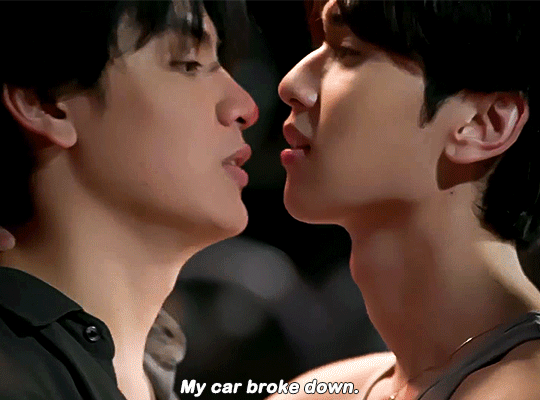

But even as this tone remains, the dialogue shifts into cheesy porn territory. Yet the delivery is still very intimate; Fadel is whispering his lines, slow and purposeful, gaze fixed intently on Style to see his reaction. Because this is something Fadel is creating for Style.
It's sex that is fun and playful and a little bit silly, and it's exactly the kind of romp that feels designed for Style. It's laughter and tenderness and comfort and sensuality and maybe kinda risky but oh so very intimate. It's a melding of pleasure and absurd frivolity that feels perfect for who Style is as a character. And it's orchestrated with such flawless precision; like the perfect, most wonderful gift.

Is it any wonder, then, that Style reacts this way?
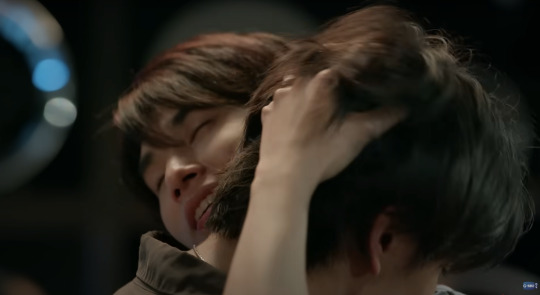
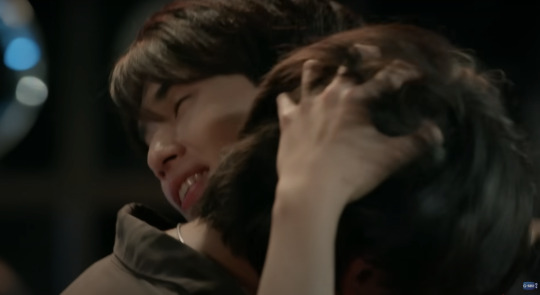
#the heart killers#the heart killers the series#fadelstyle#fadel#style sattawat#thk meta#thk ep 5#i'm in the middle of writing another post about their dynamics and this just... smacked me in the face out of nowhere#it was the only sex scene I couldn’t figure out the reason for until now#HOLY SHIT but everything about the garage scene MAKES SENSE FOR STYLE???#like the whole ambiance and vibe just FEELS RIGHT!??#more than any other sex scene so far this FEELS like something DESIGNED for Style specifically#not even something that Style may know he's into per se; but something that Style would look back on with delight and joy#and Fadel created it; he pieced it together somehow and gave it wrapped in a bow to Style I'm just *screams incoherently* about this!!!!!#hui talks thk#hui talks thai bl
270 notes
·
View notes
Text
See, it's the cinematic choices like these that convince me destiel wasn't an accident or something added last minute, it had build up and it was sprinkled all over the narrative.
It's Dean grieving so much, in a way he never grieved for familial figures like Bobby or John—there is enough pain inside him that it shattered his belief that what he and Sam did was right, as hunters protecting the common folk. When, in times of multiple Armageddon-level crises and then some, that belief is what held him together. Because hey, we may have lost people (so, so, so many people) but at least it was for the greater good.
None of that, absolutely none of that, because this loss made him feel that the job wasn't worth it anymore. This was where he drew the line.

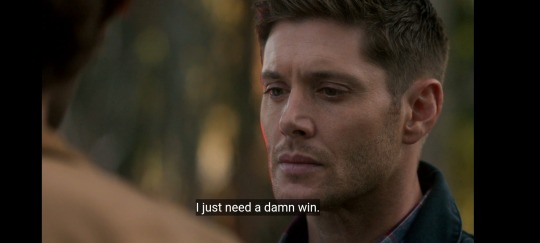
It's Dean, literally gaining back that light in his life when Castiel called.
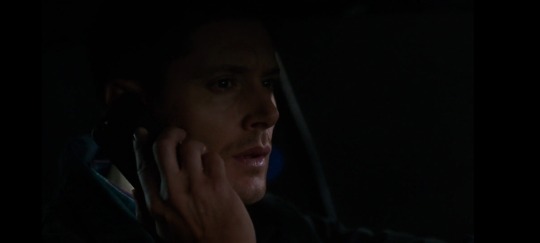
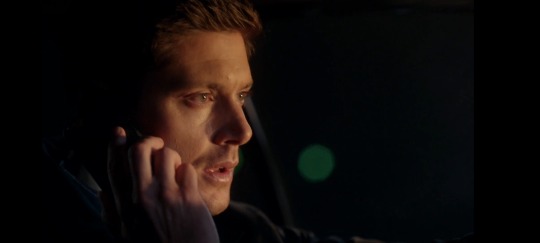
And, at the end of the episode, there are slow, dramatic close-ups between Dean and Castiel. Because Sam's grief wasn't the same as Dean's, so Sam's relief at finally having Cas again is different from Dean's.
This moment belongs to them. To Dean, who's finally finding his faith again.
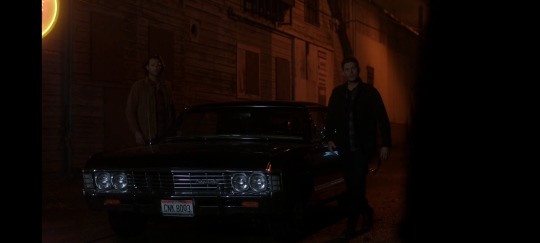
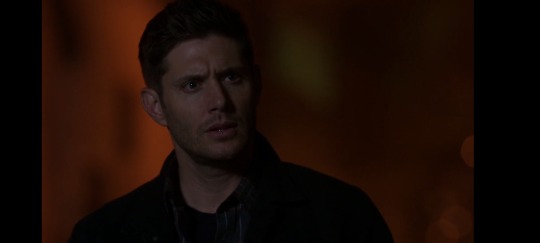

#THEY'RE SO IN LOVE I'M ACTUALLY SCREECHING UNHOLY SOUNDS#watching spn#supernatural#spn meta#spn analysis#13x05#dean winchester#dean#spn dean#spn castiel#spn cas#castiel#destiel#deancas#dean x castiel#holy shit 1k
1K notes
·
View notes
Text
I really wish Gaara's arc had been a little more involved because I truly don't think the sheer horror of it all is delved into enough. In the end it's sort of like he just. Snaps out of it. But then you start thinking about it and you're like. Oh. This kid literally could not sleep for years. Oh this kid was being tormented by Ichibi 24/7. Oh this kid had everyone trying to assassinate him when he was tiny. Oh this kid trusted one single person and they tried to kill him too and then died in front of him. Oh this kid was told everyone including his family hated him and that he was a monster and should die. Oh ok. Like sure murder was not the answer but also considering the circumstances he should've been even more out of it than he was
#all the way back in 2017 when i read it the first time i was like. you're telling me this kid literally could not sleep.#i feel like even ignoring EVERYTHING ELSE. that is insane#and then you add like 5 more layers of torture#but honestly i feel like because of the way it's treated by canon. as with anything else. the reality is not addressed#when like. holy shit#type: meta#sorta#fandom: naruto#naruto#naruto shippuden#naruto shippuuden#naruto series#naruto manga#sabaku no gaara#gaara#gaara of the desert#gaara of the sand#gaara naruto#rasa naruto
288 notes
·
View notes
Text
Essays about Ateez (a masterlist- ongoing)
because no parasocial kpop obsession is complete unless you throw thousands of words at it. ) (Updated 25.2.17)
Seonghwa: I went off about Seonghwa & Queerness to start. Which led to follow up 1. And another follow up question this one about Jongho (mentioned in the first post). An ask about the general perception of Hwa. The magic of how he speaks. How he is out and yet not. How he gentle parents stalkers. Eventually I wrote a giant thesis about Seonghwa's Idol Persona. I manifested the finger suckage. Fingers in his mouth.
Is Matz 'real'? part 1. Part 2. The Lego Liveblog (Lego Queer Kink Dungeon)
Wooyoung: 입덕요정 Idol vs Real Manly man. Manly man part 2. Manly man part 3. Manly man part 4. Manly man part 5. His 형아미 Manly man debate continues. Etymology of 영부인 fandom name. Strong candidate for bias. Analysis of his dancing. His tattoos. His post Ateez career.
Side discussion about Minsung (Stray Kids) Brief Han Mention in context of Babygirling.
Short discussion on Ateez lyrics being advanced Korean,
Mingi. The Hippo Live. Mingi's Sound and Dance. His When Aliens Attack Live. His Don't Oppa Me Live. Liveblog of Mingi's song reveal live for untitled. Follow up to live blog. Is he ND. Mingi talking about Yunho's role in his life. Mingi the old testament prophet.
Yunho: his alleged 병크. follow up to the 병크. Yunho's beauty & appeal part 1. Catholic Hottie. The Magic of Yungi (Yunho Diction Focus)
Hong Joong: Leadership style.
San: In context of Woosan Tattoo. The Magic of San Ep 1. The Magic of San Ep 2: Men Crying, and the Gyeongsangdo Accent.
Kpop Dancing. As a ballet fan. Wooyoung focus. Hongjoong and Seonghwa as dancers. The older greats.
Kpop Idoldom: To be pitied or no? First discussion (failed) on kpop values. Do I think Idols fuck around? Aegyo 애교 and its discontents. Pity for the Hardworking kpop Trainee (or not) The Inevitability of Shipping & Boy Idols all Grown Up
How I stopped fearing being identified with Kpop fandom and became a fan. Saseng discourse. Authenticity and kpop. Comparison to soccer hooliganism
I started buying stuff. The first CDs (The Golden Hour Part 2). The first Set of Merch Unboxing.
Ateez as a known unknown band. My first impressions of Ateez. The effect each member has on me (unhinged post). Analysis of intragroup relationships. Leader and Maknae Relationships in general. Sorting the members into Hogwarts. Tour 2025 Flail. Unhinged thoughts about making members fight etc. Each Friend Group Has... Ateez on Korean TV?
Fan Service/ Queerness: A short discussion about 'fanservice' type queerness in kpop. More on 'seeming' gay. Speculation (or not) about individual members' queerness. Queerness in the arts & legal research. 7 ways to view BL fanservice.
Kpop Industry: KQ's Status or lack thereof. Boys vs Girls. Hybe v Min Hee Jin controversy. BTS As the Key Turning Point of Korean Pop Culture History. My thoughts on Virtual/AI Idols. Who are the 경상도 Idol?. Shinee Fandom Story.
Ateez & Neurodivergence. Discussion 1. Focused on Mingi.
Towards the Light: Will to Power Tour 2024-25: I got tickets to the Seoul Finale! It didn't sell out immediately in Seoul. Responsible Ticket Delivery.
Writings by other fans: Eye witness account from Amsterdam! Eye witness account from Zurich! Concert Experience also from Amsterdam. San is Born To Dance!
I recommended some books and films. Music I love. More books
#ateez masterlist#ateez meta#storkmuffin writes#kpop masterlist#holy shit this is a lot#ateez#wooyoung#mingi#san#seonghwa#kq entertainment
143 notes
·
View notes
Text



a masterful filmmaking moment, in which the audience is placed in celebrimbor's position, where we both feared and sympathized with sauron presence. we can feel his eyes bore unto him, seeking understanding in a moment of open vulnerability and the desire to be heard, perhaps a moment of clarity after being called out for the abuse he laid on celebrimbor.
the camera zoom in, a rare moment of closeness, that lead us expecting a reasonable answer, and then, "you chose it."
the intimacy gone. the camera stilled. the connection has been cut. sauron is now is in the same position as melkor, and celebrimbor is now in the same position as mairon. repeating the cycle.
#the rings of power#rings of power#trop#rop#trop meta#rop meta#silvergifting#sauron#mairon#annatar#celebrimbor#telperinquar#like i'm obsessed with the camera movement here it's so subtle!!!!#the slow zoom in!!!#this was the moment celebrimbor lost all connection with sauron#the moment he realized “holy shit 😭😭😭 let me out of here 😭😭😭”#woke up from a longggg nap and this the first thing i do
201 notes
·
View notes
Text
zenshu is like princess tutu to me. I can't explain cuz I stay up too late watching the anime but it just is
they're like the quote "may those who accepts fate find happiness. may those who defys fate find glory"
and the director bird reminds me of drosselmeyer lol
126 notes
·
View notes
Text
On Kaiser’s Trauma
I’ve thought it over, and I think there’s really no way for Kaiser to awaken this match. Be it scoring a goal or getting one over Isagi, he is not winning. I don’t see it at all.
I’ve reviewed the previous character development arcs, and one thing Kaneshiro has been staunch about is that internal development comes first before external development:
Chigiri - Chigiri had to get over his fear of losing his old self by putting his leg at risk again before the narrative rewarded him with a goal.
Bachira - Bachira had to overcome his fear of being alone before being rewarded with, not a goal, but with a friend who met him where he was.
Barou - Barou had to experience his arrogance being crushed and overcome the subsequent resignation he felt before he could reclaim his role as “main character.”
Hiori - Hiori had to first come at peace with giving up soccer entirely—something he had been hesitant to do, even when it hurt him, because he didn’t know what else to do—before discovering what soccer really means to him.
Yukimiya - Yukimiya found salvation when Isagi saw him as he was desperately fighting for a chance while he could still see.
It’s a bit different for Isagi’s main rivals, though:
Nagi - Nagi got motivated to put in an effort because of Isagi -> Got stronger during Second Selection -> Went back to old habits just to beat Isagi once -> Regressing in the rest of the NEL arc
Rin - Rin had to stop seeking answers outside of himself -> Unleashed his true ego during the U20 match -> Subconsciously sought affirmation from Sae at the end of the match -> Felt rejected by Sae -> ??? (The current match against PxG is ongoing, so I don’t know how he is right now)
Nagi’s and Rin’s development arcs are not linear, and currently both are in the lower curves of their arcs. This is because they haven’t fully solved their internal problems. Until Nagi finds a reason to push himself outside of beating Isagi and until Rin gets over his brother issues, they can never fully grow.
Likewise, Kaiser, who is undoubtedly also a main rival, has to first fucking get therapy process his childhood trauma before he can truly awaken.
But trauma is not easy to overcome. In fact, you don’t even really “heal.” Kaiser “getting over it” in just one match is impossible. As such, I don’t see him winning. At least not now.

Isagi throwing Kaiser’s words back at him by calling him a “clown” has gotten some people to think that Kaiser’s awakening is imminent. After all, a similar thing had happened to Barou before when Isagi called him “donkey.”
But Kaiser is not Barou. Both may be arrogant, but one of them didn’t grow up under violence. And as I’ve said before, internal development comes first. Barou’s internal problems, compared to Kaiser’s, are much easier to resolve.
And unlike Barou’s, Kaiser’s problems are not confined within soccer. They seep into his every being and in all aspects of his life, as we can see in how he treats himself and others off the field.

To begin, let’s talk about what Kaiser thinks of himself:
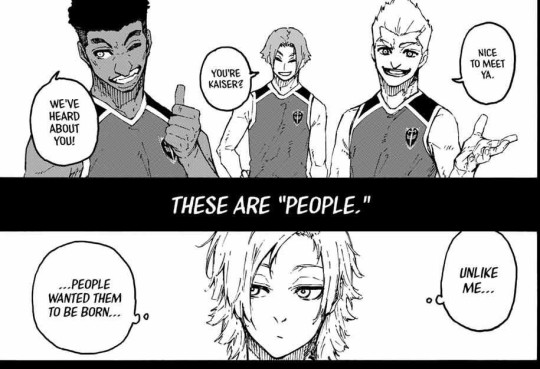
Alternatively, Hoshi’s translation of Kaiser’s monologue goes like this:
These guys are “humans.” Different from me, they were born wanted “humans.”
Having been abandoned by his mother and growing up abused by his father, Kaiser’s sense of worth is so low that he thinks he was born without it—which is wrong. Everybody is born deserving to live.
But Kaiser thinks otherwise. He sees himself as not even human because nobody wanted him alive. Still, he has this strong desire to live—a desire that had first made itself known to him at this moment:
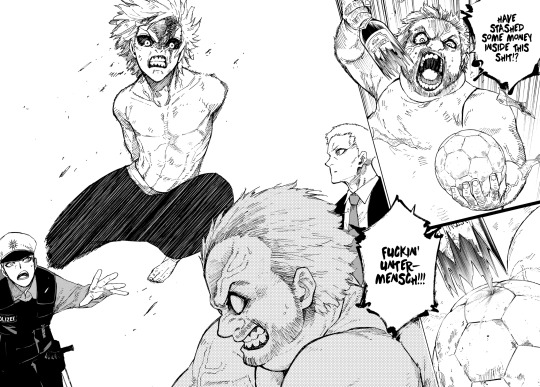
Right before this, he had looked so dead inside:
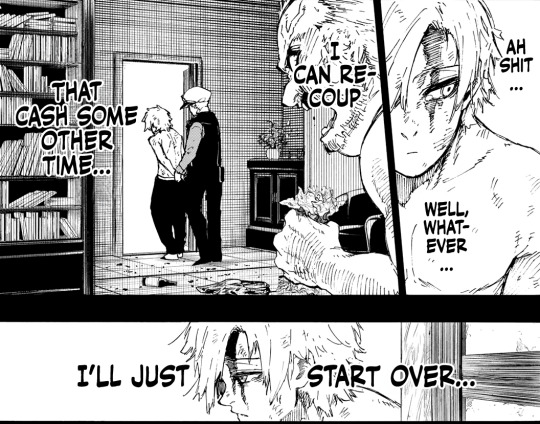
He didn’t flinch when the cops came to arrest him. He didn’t try to fight for the escape money he had stashed away. He was so passive and tired and helpless that he might as well be truly dead.
But at that moment his father was about to destroy his soccer ball? A fire lit up inside him. A fire so bright and strong that he got to beat seven cops while handcuffed.
That fire was the love he had for soccer. All his life he’d been in a passive position, but when he fought for what he love, the reins of his life got transferred into his hands.
And in that moment, Michael Kaiser, for once, was truly alive.
Now, he’s living his life in constant search of that fire—or “proof of his existence,” as he puts it.
However, Kaiser has misunderstood what that fire is. After all, how can he recognize love when he’s never been loved?
Only pain and violence are familiar. Thus, it is honestly no surprise when he misattributes “proof of existence” to “inflicting malice on others, living on inside them as a scar.”
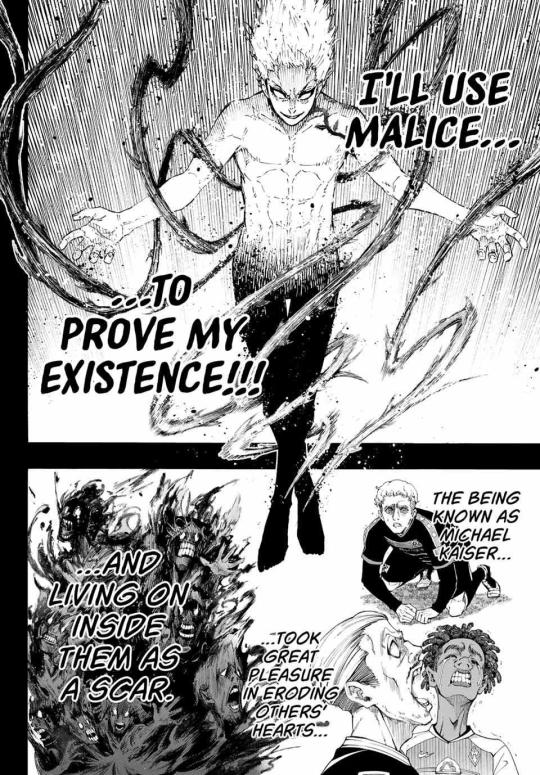

For Kaiser to grow, he has to redefine “proof of existence.” How can his own existence depend on the number of people he defeats? That’s unhealthy. And as with Rin’s problem, it’s just seeking answers outside of himself.
But for Kaiser to even begin redefining it, he must first learn to recognize love for what it is.
Love was the fire that was lit inside him. He must go back to it. (Like how Bachira awakened by going back to how he used to play as a child.)
Love is also the main thing that sets Isagi apart from him—the former having been raised by loving parents and having companions sincere to him—so it’s crucial that he learns this if he wants to defeat Isagi.
How can he do this? With the way he was raised, I don’t think Kaiser can learn love on his own. He has to learn it from others. But before that, he must see himself as “human.” While he still views himself as “non-human,” Kaiser won’t be able to connect deeply with “humans” and welcome any love from them.
And this is the crux of his problem...
Kaiser has made attempts to be more “human,” but...
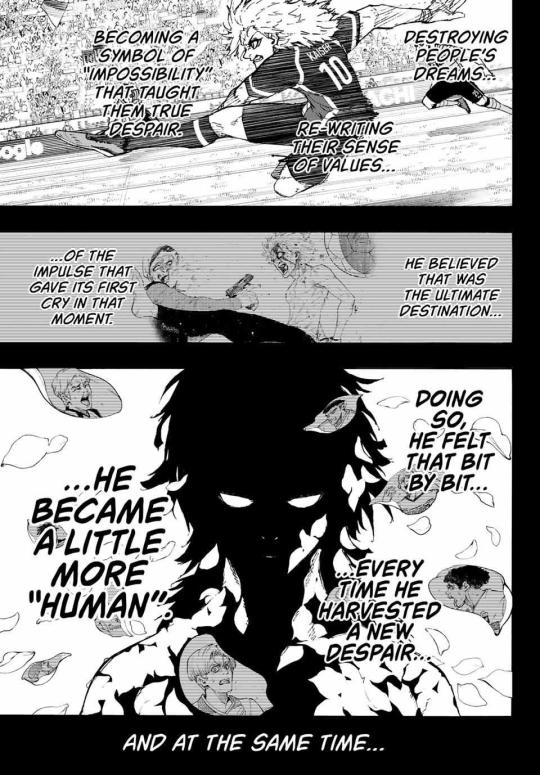
... he’s going about it so horribly wrong 😭😭😭
@galaxynajma also sent this question:
What do you think is the new reason for why kaiser does this every morning: His morning routine consists of: standing before the mirror naked, gazing at himself while having a conversation (to himself), getting into the mindset that nothing is impossible, and then smiling while thinking ‘this is me’. (Trivia from Blue Lock wiki)
“This is me” is Kaiser reaffirming to himself that he is becoming more “human” when he sets out to achieve the “impossible.”

How to be Human 101
Okay, fuck, to be completely honest, I have no idea! I didn’t expect to get this psychological while I was writing 🫠
I had… written myself into a corner. But anyways, I’m gonna try seeing this through...
So, I’m no psychologist, but… I relate on a deeply personal level with Kaiser’s “human vs non-human.” But in my case, I had used the words “normal vs not normal.”
(This is gonna get a little bit personal, but bear with me!)
This distinction was something I strongly felt during my peak depression years. I felt like nobody truly understood me because they hadn’t been through what I had been through. Whatever the doctors said just went from one ear to another because I couldn’t trust them. In my head, I had categorized them as one of the “normal” people—their lives were so put-together and they were so in control and on top of things! Not like me, who was drowning.
I also slowly distanced myself from friends because they, too, were the “normal” ones.
One friend, however, stuck around. She didn’t mind me going missing for months without a word. And whenever I showed up again from who knows where, she would always excitedly welcome me back as if I never even left. And this was the friend who I thought to be always better than me in every way because she was prettier, smarter, and had a better financial status. So I never really expected her to get me.
But oh, she did. I found out that she wasn’t “normal,” too. She too had her own problems, and we got to share our sorrow with each other...
So, I guess what I’m trying to say here is that...
It’s not really a matter of erasing the distinction between “human” and “non-human.” It’s enough, for now, that Kaiser finds another “non-human” like him, and with whom he will slowly start to feel “human”—worthy of living and being loved.
I know Kaneshiro isn’t fond of therapy talk, but for Kaiser, I think it’s a must that he gets to open up to someone. He doesn’t have to share the full story. He just has to be sincere about it.
And who is the closest “non-human” that we have around Kaiser who’s also unwanted by his family?
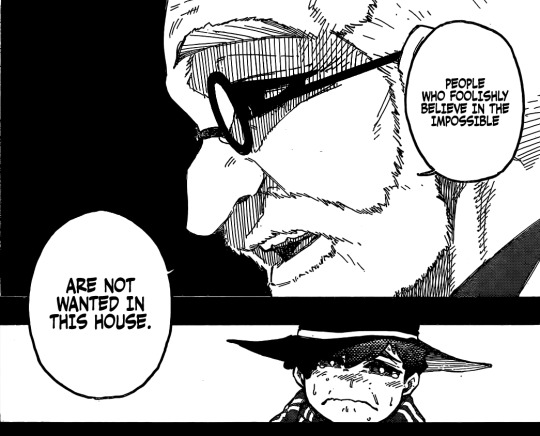
Ness.
This doesn’t even have to be about shipping. And I know their relationship is looking pretty grim right now because of how Kaiser has been treating Ness since the beginning, but...
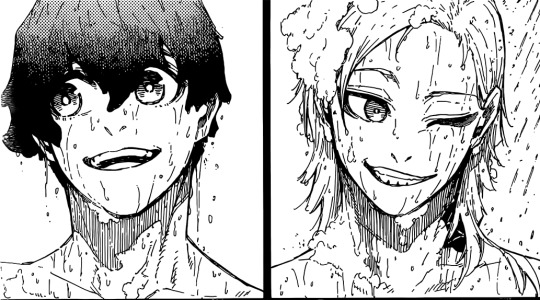
...I still believe that this, at least, was real.
Together, they can learn what it is to be “human.”

In summary, for Kaiser to awaken, he must first resolve his internal problems. To do this, he must...
Find a fellow “non-human.”
See himself as “human.”
Recognize love for what it is.
Redefine his “proof of existence”
Thank you for coming to my TED talk, *bows
---
Okay, so I don’t normally do this at the end of my posts, but I just recently launched my Alpha Reading Service. If you liked my analysis above and would like me to review your story the same way, do check it out!
Or, if you don’t need any alpha reading, consider tipping me on Ko-fi instead. Thank you!
#*checks time#THIS TOOK ME ELEVEN HOURS TO WRITE HOLY SHIT#AAAAAH#I still have to prepare for my classes 🥲#i’m going back to reality folks#take this and go!#michael kaiser#blue lock#michael kaiser meta#blue lock meta#michael kaiser analysis#blue lock manga#miyamiwu.meta#miyamiwu.src#kainess#alexis ness
214 notes
·
View notes